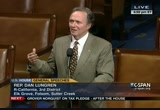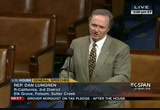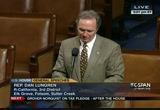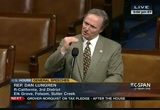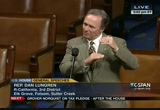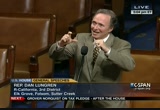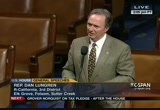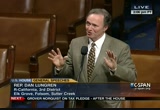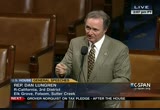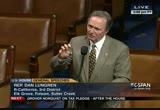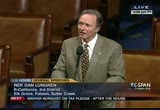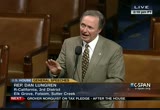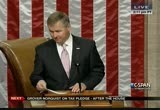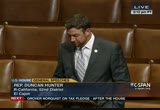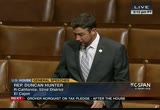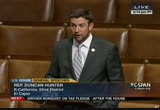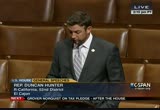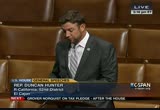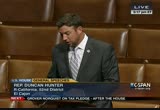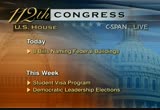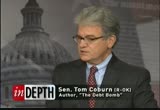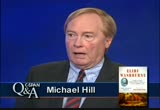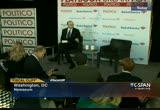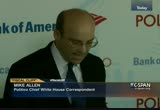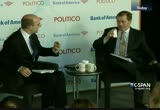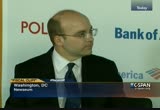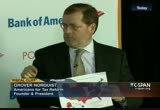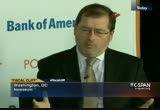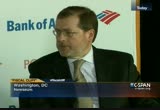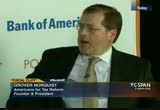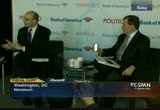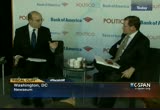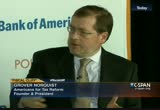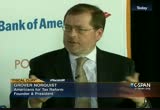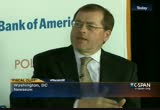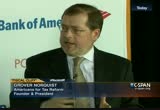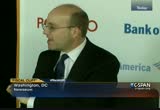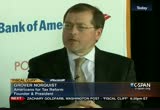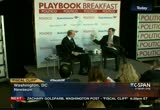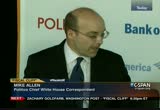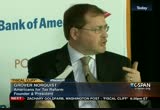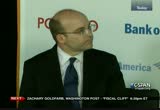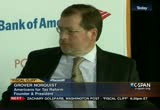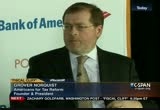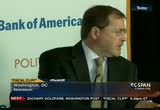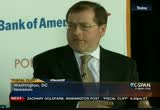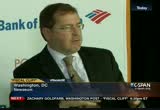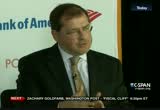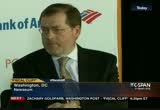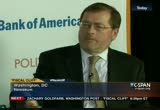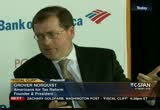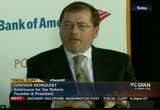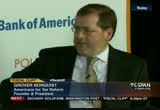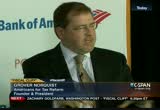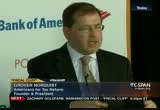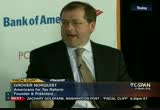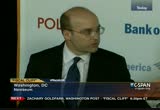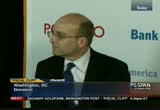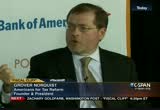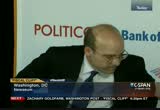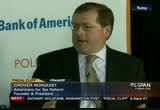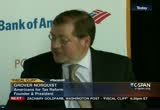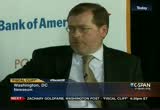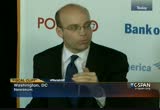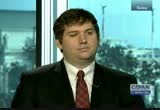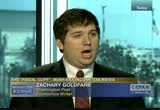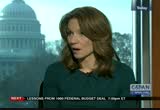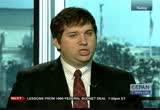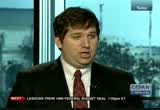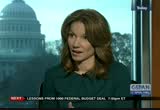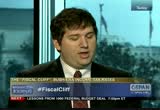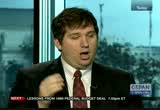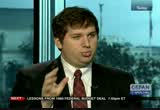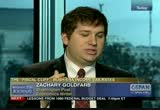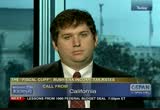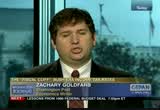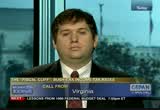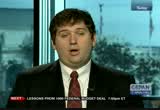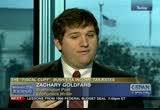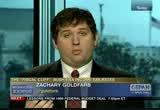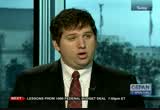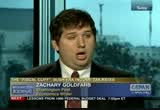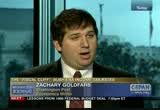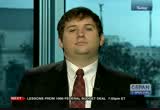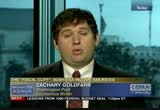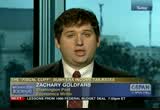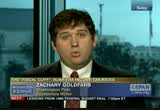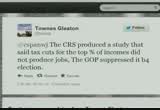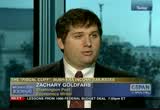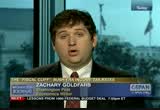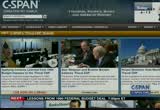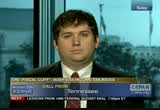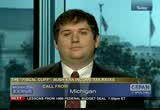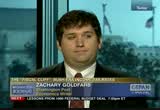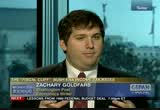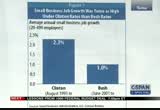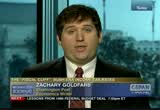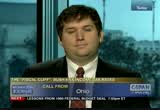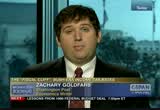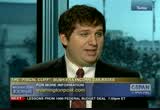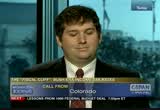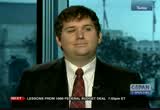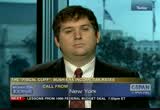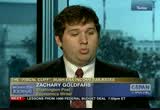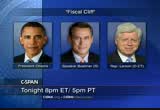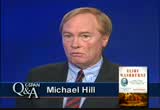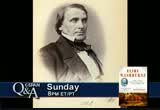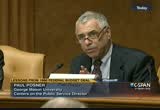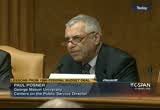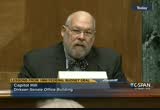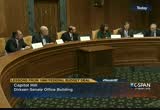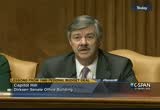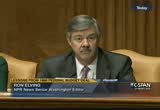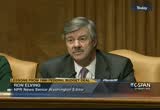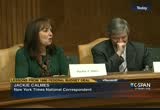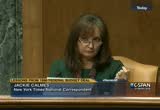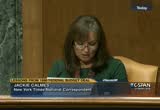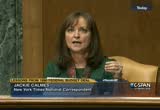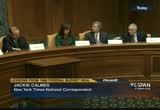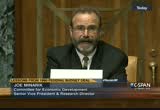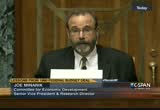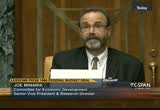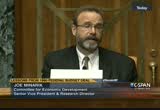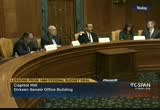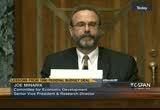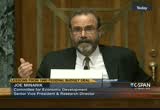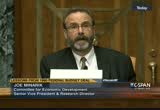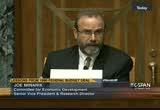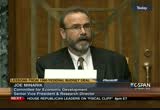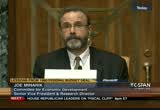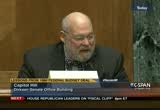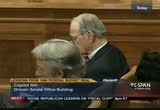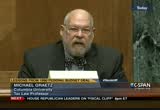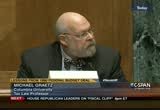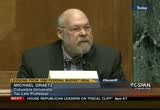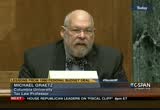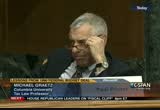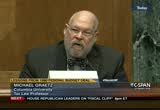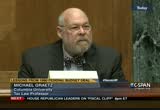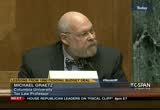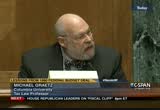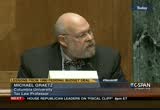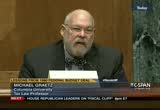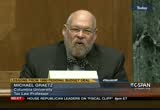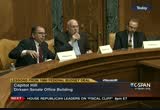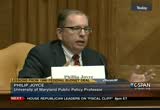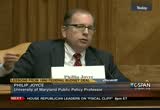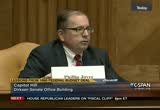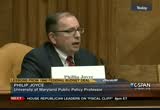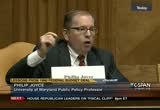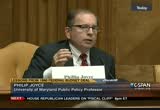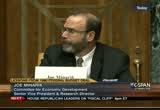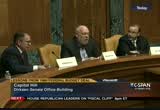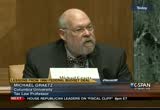tv Public Affairs CSPAN November 28, 2012 5:00pm-8:00pm EST
5:00 pm
went to the hospital and instead of you having accurately recorded what your blood is you had another blood type and you were going to need a blood transfusion during that surgery, what if they were able to change the indications you have for medications or the counterindications you have so you would be subjected to medicines that were not in fact good for you? what if that happened in a couple of major health systems in this country, in different parts of the country? would that be a psychological attack on the nation? if we shook the confidence people had in the system? what if they were able to invade a financial services operation, so that your account could not be verified and someone else's account couldn't be verified? what if in fact they controlled some of the systems that deal with our trains so the trains would be colliding rather than missing one another? and what if they controlled the
5:01 pm
critical infrastructure that we call our water systems or our electrical -- electricity delivery systems? i mean, these are real questions. what do we need to do? we need to understand that it's going to require a cooperation and a collaboration between the public sector and the private sector. look, i'm a small government guy. i believe in limited government. i also believe that limited government we have ought to work, ought to be robust. and the government, the federal government has a responsibility in the area of cybersecurity, in my judgment, and we have been in some ways not facing up to that. this administration, the previous administration has done some tremendous work in advancing the cause. congress has examined it. we've had hearings. we've put forth some profltse, but we haven't had a complete -- proposals, but we haven't
5:02 pm
had a completed project. we need to make sure we understand that as far as the federal government is concerned, the entry point for the private sector ought not to be n.s.a., because it's part of the military, it ought to be d.h.s. and some people say, well, i didn't like d.h.s., shouldn't have -- well, d.h.s. existed for a decade. it's gotten better, much, much better in terms of competency in the area of cybersecurity. we ought to build on that. we ought to have that as an entry point. we shouldn't have the idea of civilian control of the military. and n.s.a. is unbelievably good. they're the best in the world at what they do. we have to make sure there's a proper relationship. i think the administration, the previous administration has established the means of doing it but it not to be the idiosyncratic answer to one administration to the other. it ought to be institutionalized so people can rely on it. second, we need to create a
5:03 pm
platform of trust and competence and experience between the public sector and private sector to be able to utilize the information that is -- that comes to one or the other. what do i mean by that? when the federal government learns about attacks that are taking place, cyberattacks that are taking place in one place, they ought to give it to other parts of the public sector so they can protect against it. at the same time we ought to set up a platform to establish that confidence so that the private sector will feel better about giving their information to their government so they can help them protect against that attack and let others know that that attack might be there. that comes with experience. that comes with trust and confidence that can only be established over time and we need to have a structure that allows that to happen. i produced legislation to do that. unfortunately it never reached the floor of the house of representatives for reasons i won't go into, but the fact of
5:04 pm
the matter is we still need to do that. you can build -- you can say you want to build trust by establishing something, but you have to have it established, you have to have people there to understand one another, work with one another. they have to gain trust. that takes time. we need to do it immediately. we need to have some sort of means by which we work with the private sector that involves itself in critical infrastructure in such a way that the impact of a failure of that piece of infrastructure to the public will be protected against. now, let me give a simple example. this was an example that i paraphrased from former secretary chertoff. let's say you are a piece of the critical infrastructure and you realize that a failure will cause $1 billion worth of damage to your company, but the impact on society may be $50 billion. the delta between $50 billion and $1 billion is one that has
5:05 pm
to be in some ways dealt with in terms of that relationship between the federal government and the private sector. and we haven't figured that out yet. my way of doing it was to create a voluntary program where you would have different elements of our economy deal with d.h.s. with support of others coming up with what would be best business practices and then if those best business practices were adopted by those within that element of the economy, they would get liability protection, liability immunity. now, some say, wait a second. that leads to a slippery slope that the government will come in and crash in on you. i don't know the perfect answer but i can trying for the lightest regulatory approach we could have. and those worried about the
5:06 pm
federal government coming in heavy-handed are truly concerned about that, they ought to think about this. if we have a successful cyberattack against a part of our critical infrastructure, my fear is that congress and whoever's present at the time will overreact because the public will require it. wouldn't it be better for us to anticipate it? wouldn't it be better for us to get ahead of the crises and then have a means by which we defend against it? we know we're not ever going to be totally 100% successful. so when it happens to diminish the impact on whatever critical infrastructure we have, third, mitigate against the damage when it occurs and, fourth, be available to rebuild, respond and have the services available to the public sooner rather than later. i had hoped to be here another 10 years to work on that. i will not be. i will be on the outside
5:07 pm
wherever i am urging this congress to look this issue square in the face and do something about it. i'm absolutely convinced as secretary panetta said, one of the greatest threats to this nation is a cyberpearl harbor. and the potential of that is greater because the capacity to strike against the country is more protuesday than ever before. the capital investment for a successful cyberattack is much less than the capital investment needed for weapons of mass destruction. we ought to understand that. we understand that sooner rather than later. cybersecurity ought to be an issue on the front burner of this congress going forward. it ought to be an effort to work the administration with the congress, democrat,
5:08 pm
republican, conservative, liberal for the good of this nation. as i leave this place, i can think of no external threat that is greater than the threat of cyberwarfare. and as i leave this place, it is a -- i don't know if i call it confession -- but it is an admission of mine that we have not done all that we have needed to do. i'm not blaming anybody. in the aftermath of 9/11, the first thing we had to do is try and protect against a similar attack. we have strengthened our air travel in this country. we have strengthened our security against attack to our ports. we have strengthened our ability to protect against a terrorist attack on our chemical facilities, although we still need to do more there. we have protected our transportation systems to a greater extent than existed before. we have greater cooperation and coordination among all levels of law enforcement.
5:09 pm
there's a greater level of respect among the private sector parts and the public sector. but cybersecurity remains, in my judgment, the lagging indicator and the lagging response. i would hope -- i would hope that partisanship be thrown aside. i would hope that fear of the government -- although i understand that well and i have been a proponent of that of an oversized government and overly strong government, but fear of that will be tempered in the sense that we understand the threat to all of us, our standard of living in so many different ways is real and that we right now have the greatest minds working on cyber.
5:10 pm
last thought is this. if any young person is looking for a job or a career for the rest of his or her life, start training in cybersecurity. we need to do more in terms of educational program. we need to do more of training. china is training a lot more people in cybersecurity than we are. it's not because they have a larger population. it's because they're dedicated to it. we could lose our edge. we could lose our edge if we don't that, so i would ask this congress going forward, i would ask this administration going forward to put cybersecurity at the front of the line, not the back of the line in terms of training our people, educating our young people, identifying this as a career path for so many of them, making a commitment in our government in terms of the budget that is necessary but also that spirit of cooperation and collaboration that must exist between the private sector and the public sector, we are at
5:11 pm
risk. there is a real and present danger out there. we have the capacity to respond to it. we have the ability to be the best in the world at this. we have the ability to protect ourselves better than any other country in the world, and we will, if we will turn our face towards the problem, rather than away from the problem. so, mr. speaker, i thank you for the time. it is my hope that this country recognizes the threat, deals with the threat and successfully looks to the future for ourselves, our children and our grandchildren. and i yield back the balance of my time. the speaker pro tempore: the gentleman yields back. under the speaker's announced policy of january 5, 2011, the chair recognizes the gentleman from california, mr. hunter, for 30 minutes. mr. hunter: thank you, mr.
5:12 pm
speaker. it's my honor to come before you and speak about a true son of america who lost his battle with cancer six days ago on november 22. here's an article here from the local paper in san diego talking about dan mckennon and it says navy pilot, radio and airline executive, appointed to two federal boards and son of san diego congressman. those are a lot of things but dan was so much more than all of those even put together. first, his father was a democrat congressman from san diego here in the 1950's. probably stood at this table like i am speaking now. dan was a page when we still had pages in the house in the 1950's during the truman administration as well. he had a great respect and love for this country and he had a great respect and love for this body and the institution. he has some great claims to fame. one of those is this -- as a young man, dan served in the navy as a helicopter pilot and
5:13 pm
he's credited with 62 saves on land or sea. that's more saves during peace time than any other navy pilot in history. he loved the navy and loved flying and that led him to other things in life. he was a great pilot. he was inspired to fly from some words taken from the movie "the bridge over toko" and i will summarize what made him want to be a helicopter pilot. there were some folks talking in this movie that basically said, where does america get these kinds of people that want to fly off these platforms that are floating and fly back out to these platforms again in the middle of the ocean, try to find those platforms and land on them, where does america get them? they are the greatest in that country. that aspired dan to join the navy and do exactly that, fly helicopters and rescue his
5:14 pm
fellow sailors that had the bad luck or bad skill to land in the water. he bought a country radio station in san diego and transformed it, made it into one of the most successful radio stations in san diego county. at the same time in 1977, he was the president of the country music association in nashville. he also served on the nashville association of broadcasters board of directors here in washington, d.c. as i go through this litany of things that dan mckinnon did, we can see -- mckinon did, we can see his faith in god, his selfless service to country and christianity played through throughout his entire life. he ran for congress. he tried to get in this body in 1980. he had an unsuccessful run for congress in 1980 but the next year, president reagan nominated him to lead the federal civil aeronautics board which basically oversaw the deregulation of all the
5:15 pm
airlines. as i know, as somebody that wants less government and less big brother intervention, dan mckinon was the man after he did his work on the civil aeronautics board and deregulated the airline industry so we have what we have now which is competition and low rates and extremely high safety measures, he shut down his own board that president reagan started. rarely in washington, d.c. do you see a person that starts some kind of board or blue ribbon panel or commission and actually closes it down on themselves after they've done the work that they needed to do. that takes a special person. that takes a special person to give up the reins and say we don't need more bureaucracy. we're going to shut it down. we've done the work that we were assigned. . he did it because he wanted to help the country and
5:16 pm
loved being a pilot and the airline industry. people say that the airline industry right now, the way that it is is a direct reflection of how he deregulated it. that was a big deal when you had the federal government dictating fares and routes and change that to a free market system where free competition could enter, it took a long time and took a man of special significance and dan did it. his daughter, who i think is a lieutenant in the navy right now doing tension work for the navy sales said this, he would say that his navy ways were the only thing he did by himself. everything else was a team effort. he loved being a pilot and flying for the navy and he flew and sailed until the end of his days. he also worked for the central intelligence agency and had him
5:17 pm
doing special projects and got the seal award from the central intelligence agency. you take all of these things together and see a man who had a full life, a full family, loved and served his country and had courage and true grit and true faith in god that god would help him lead him through his life and his path and trusted in the lord to do that. on a couple of other separate stories, dan taught me how to jump motocross bikes. i got my first job at a tv station doing the news camera that his brother had. i got to work on his airlines after high school, in between college. i'm a young guy. i'm only 35 years old and sometimes young guys like myself need people to look up to, people that give us structure and people that tell us which is the right and the wrong way. he was a mentor of mine and on
5:18 pm
5:20 pm
>> and with the same or better outcomes. >> this weekend, you can talk with senator tom coburn about the fiscal cliff, affordable care act and future of the republican party. the senator has written several books, including his latest. join our three-hour conversation with your calls, emails and tweets for medical doctor and senator tom coburn on book tv's "in depth" on c spanning 2. >> washington worked his way up and wept to harvard law school and went out west to illinois to galena where the industry was in its heyday. arrived by ship by stagecoach, by train and arrived on steamboat in this muddy mining
5:21 pm
town. boarded themselves in a log cabin and established themselves in a log cabin and worked his way up and became a very successful lawyer and got involved politically. ran for congress, served for eight terms and then befriended abraham lincoln, obviously from illinois and then grant. and as they were on the rise, washburn stayed with them as a close colleague during the civil war and after grant was elected president, he initially appointed washburn secretary of state and at that time, wash burn became very, very ill and his family feared for his life. after 10 days, he submitted his resignation and grant regretfully accepted his
5:22 pm
resignation. over the next several months, he regained his health, which was always very fragile. and so grant then offered him the position as minister to france. >> researcher and author michael hill. washburn, minister to france and only diplomat to stay during the siege of pars -- par is. sunday night at 8:00 on c-span. a conversation now with the founder and president of americans for tax reform, grover norquist. he is the person who got some members of congress to sign a pledge to not sign taxes. a number of republicans said they are willing to vote for a tax increase. this is just under an hour. >> thank you for coming out.
5:23 pm
two weeks in a row, thank you very much for coming out and we will have another one next wednesday and we appreciate you being here. grover norquist, president of americans for tax reform. people who are following us on twitter, just tweeted, we'll take your questions. we want to thank the bank of america for supporting these series. the forum is about issues that matter most in washington. last week, how the obama campaign won and today we will talk about very important issue for conservatives and republicans, the path forward for them and their party. we appreciate bank of america's partnership including at both of the conventions. and we are going to bring you into the conversation. you got cards. we would love to take your
5:24 pm
questions and also be getting questions as they call it on "morning joe"," the twitter machine. we would love to bring out grover norquist, president of americans for tax reform. good morning, grover. [applause] >> you don't have your bag. he is attached to his bag. >> they told me it was too streamlined up here for the bag. >> thank you very much for coming out. can republicans raise taxes and not break your pledge? >> difficult. >> it's not know? >> close to no. look, here's the challenge we have. the republican party has built the brand that the party won't raise your taxes. the pledge has made that easier to do because the pledge doesn't change over time. it doesn't change across state
5:25 pm
lines. in the past, it was difficult to say to somebody, oh, i won't raise your taxes. you have a democrat running who said now is not the time to raise taxes, which is the equivalent of not to raise taxes next week. the pledge takes the words out and says i'm going to go to the state capital at governor, state legislators as a congressman, senator, president, i'm going to reform government and not going to raise taxes, tells you an awful lot about that because they can't take it back. >> when republicans are running in primaries you get them on record doing this. 98% of the current house republicans signed it. 93% of the incoming house republican incoming congressman. people used to be afraid of you. on "the colbert report," they
5:26 pm
had a lightning bolt. are you frost ti, melting, losing your power before our very eyes? >> one is the scenario that republicans were afraid for americans for tax reform and took the pledge because i told them to. that is colbert territory, harry reid. that's nonsense. people take the pledge. the reason why most republicans and handful of democrats take the pledge is they don't intend to raise taxes. we send the pledge out in the mail and people make that commitment and make it part of their campaign. >> if you are running in a republican primary, it would be difficult to run in a republican primary without sin signing it. does someone come to you and look for a way out? >> what you generally have is, you have a complicated bill
5:27 pm
which has a lot of moving parts, does it raise taxes? it's pretty clear in most cases. the important part of the pledge is it allows people to credibly commit they aren't going to raise taxes and people know who and what they are. boehner and mcconnell have governed easily. they aren't going to raise taxes and allowed the republican governors or the 24 states with a republican governor and republican legislature, depending on how you count new york, 13, 14 states have a democratic governor and house and senate and there you see the red states are not raising taxes. they are cutting taxes and the blue states are raising taxes rather than reforming government. the fight we are having in washington where there's gridlock in the states you have the opposite of gridlock for the last two years.
5:28 pm
there was an article about it last week true for two years, legislators in the various states that you've got 24 states where the republicans get together and turn their state into hong kong or texas and maybe 14 states where the democrats can turn their states into greece or california. >> the wording goes back to 1986. >> part of passing the 1986 bill, we did it as americans for tax reform. >> the wording of the pledge hasn't changed. in 1986 when people first signed that pledge, the federal budget deficit was $220 billion. this year, $1.1 trillion, how can you say nothing has changed? >> lots have changed. bush focused not on spending.
5:29 pm
the pledge only does certain things. the pledge makes tax increases more difficult at the state level, at the national level. you haven't had a republican vote for income tax since 1990 when bush threw away his presidency. 1993 tax increase, only on democratic votes. then no tax increases until 2009 when obama came in and raised taxes with obamacare. >> isn't this -- you are having republican is take a difficult pledge to cut taxes, isn't that like a quarterback saying they like taxes? >> it's a pledge not to increase taxes. people say why don't you toughen it. you don't want to change it because it is a simple guardrail. it doesn't solve the world's problems, it says no net tax increase. >> in your mind when someone
5:30 pm
signs it, how long are they committed to it? >> in writing when the person signs it as long as you are a congressman or senator. >> you are signing this for life? >> unless you intend to be a congressman for all of your life. >> a career decision. >> if someone tells you they are pro-life or pro-choice, is this 18 months or a year? how long are you pro-choice? you are telling someone who you are. i'm the kind of guy who is pro-choice or pro-life. two people have brought that up. latourette who decided to leave congress he said yeah i made that promise a long time ago and i went into district and talked about banks and mortgage. mortgage, that was 20 years ago. you are still sending me letters.
5:31 pm
people make a commitment. it's an easy simple commitment and reid doesn't understand because he doesn't share that principle. the government's too big now, we don't want it to get any bigger. why would you give it more money. all of the effort by obama to raise taxes is to expand government, to backfill the increase in government, he wants to make it a permanent increase and needs to raise taxes to do it. and the fact that republicans have said no -- and he could have done it in 2009, 2010. all this stuff wanting to raise taxes on the rich? he could have done it in 2009 but he didn't. >> let's break down the current situation. politico had he an astonishing story about tom cole, one of the calfiest operators in congress, former chairman of the house
5:32 pm
republican campaign committee who talked to the republican whips and told them they would be needing stronger bargaining position with president obama if they were to give taxpayers an early christmas present, vote to stepped the bush tax cuts all but the highest income earners and negotiate later about the highest -- about the very top bracket. that sounds like a way out of this corner the republicans have painted themselves into. >> it's an interesting tactic or strategy. the challenge is -- >> you're not against -- >> two things. by announcing -- we are trying to decide how to cut spending and we have a spending problem not a failure to raise taxes problem. and i think we should be focused on spending and when you have chambliss, four or five congressmen have said, we could raise taxes here and there. to be fair to them, someone like south carolina lindsay graham
5:33 pm
said i would raise taxes a little if i could get a guarantee of entitlement reform, a series of things democrats will never give them. when the "new york times" or cbs reports that conversation or talk by lindsay graham, they said if he said i would be willing to raise taxes, the rest of the conversation disappears. so the challenge for cole -- obviously this was leaked, i don't think he intended to have a public conversation, but if you say things in front of 150 people -- >> he gave an interview. >> he meant to get it out that. then have a conversation about trying to raise taxes and we are sitting -- a handful of republicans -- as you say over 90% of the republicans kept the pledge. all this talk about someone might break the pledge. people having impure thoughts.
5:34 pm
>> impure thoughts? >> under certain circumstances -- >> what do you mean by impure thoughts? this is a family event. [laughter] >> maybe thinking about raising taxes. >> is that what republicans do? >> no. a few of them talk about it on tv. the good news is most of them don't. the handful in the last week said we might raise taxes under certain circumstances and i have chatted with a bunch of these guys and they are clear, i said no, under these circumstances would i do that and point of fact, same five or six people -- >> let's be very specific and i covered you for a long time and you are a survivor. you are -- you have a practical streak. you have never been advocate of suicidal legislative strategy, so i know that you are looking
5:35 pm
for a way that republicans can come out of this with their principles intact but politically viable. let's take -- >> doing reasonably well. >> understanding what you said about all things that are said around it, but if the choice is having all the taxes go up and have republicans be blamed and it's clear from polls that that would be the result and clear that from the reporting on politico and elsewhere, ben white had something this morning where he talked to financial executives and talked to the white house and they have a state of the union and inaugural coming up and can use the bully pulpit. republicans know they will be blamed, if that is the choice or to cut taxes for almost everyone, you would be for taking that choice, right? >> first of all, i accept that
5:36 pm
if nothing changes that could be the scenario that plays out, but i'm not in favor of waiting for the train to hit you. one of the things -- >> that's what tom cole is advocating, rather than have republicans take this bath, go ahead and cut taxes for most people and then negotiate the rest. >> let me be clear. we can change the playing field so the republicans don't get blamed and the president is blamed if he is not insistent on not cutting spending and going over the fiscal cliff. he is out campaigning. last year he was campaigning and he is not being president. he is not negotiating that he said he was going to be, he is campaigning and/or golfing. where is this story? i'm making two case is to the republicans and the democrats who listen. i believe we should have the negotiations on the fiscal
5:37 pm
cliff. that's two things. $500 billion tax increase, the 2001, 2003 tax cuts lapsing and sequestration of spending restraint. it is a good thing, but saving $100 billion, -- >> not a common republican point of view. a lot of defense cuts. >> the head of the conservative caucus, 60% of most conservative guys in the house, jim jordan said the only thing worst than the sequester would be not having the savings and you saw mitch mcconnell saying we aren't ending the sequester. people are drawing lines in the sand -- let's try to cut to it. >> it has to be on c-span only then would the president have to say and boehner would say your spending cuts are what? cbs and nbc hasn't done that. and he was wandering around and
5:38 pm
if you look at the savings in this budget, $800 billion for not occupying iraq. and he cuts that as part of the savings. he counts of the savings, then you can't have the situation where republicans get why don't you raise taxes all day and no focus. once the bill is written, it needs to be online so everybody can go on their computer and read it and guys in the press can read it and talk radio can read it and citizens read it, not just congressmen or lobbyists and this is aren't obamacare and then surprise to the american people. if you do those two things you won't get a bad bill rather than trying to negotiate with ourselves with cole is doing. he isn't negotiating with anybody when he is having that
5:39 pm
conversation, let's actually have transparency and the reason it is particular fun is that obama promised he would do obamacare in front of c-span and didn't and said he would. and nancy pelosi, boehner and the president that bills would be online for a readable time. needs to be seven days. >> we are on c-span. we're online. and i want to be clear about this. you're not against new revenue? >> i'm certainly for new revenue for economic growth and to give you two numbers to set the stage. this is important. grow at 4% rather than 2%. reagan percentages rather than french or obama percentages, 4% rather than 2% for one decade that would net $5 trillion in additional revenue and pay down the debt obama ran up and pay
5:40 pm
down in a decade from stronger growth. you don't get stronger growth by raising taxes, but less growth. raising taxes doesn't give you the revenue but growth gives you the revenue. i'm in favor of real growth not imaginary revenue. >> the flip side of the tom cole argument, if you don't agree to a small tax hike now, tax hike, there will be a much bigger tax hike to take place which would be everyone's taxes would go up when the bush tax cuts expire and then democrats would get credit, the president will get credit for the largest middle-class tax cut in history on january 2. how does that politically benefit your team? >> how you work this out is how boehner and mitch mcconnell will competently do. boehner is the guy who has taken
5:41 pm
the pledge and kept it. he is the leader who kept every republican off the stimulus package. there were 30 or 40 republican appropriators who might have wanted to do shoplifting and part of that stimulus package and boehner was able to persuade them, don't touch it. it was a democrat-owned corrupt mess that didn't work. had 20 republicans, oh, can i get something for my district, then it would have been a bipartisan mess and 2010 would have never happened. boehner and mcconnell understand if the republican party is a part of obama's self-inflicted damage, if you hug him and do bad things that is unlikely to work. >> is there a loophole in the pledge, if all the bush tax cuts expire and everybody's taxes go
5:42 pm
up and then republicans vote to eliminate taxes on everyone or to reinstate the bush tax cuts for everyone exeps the highest earning, they are voting for a tax cut, right? >> harry reid doesn't get it. the pledge isn't to me but the american people. if you are a congressmen or senator, you can say 20 different changes in the tax code in spending, look at this, this isn't a tax increase but a good piece of legislation, you should be happy and people look back and say yeah. it's not only a test the day you pass it and obama explains what's in the bill, bush explained what was in the 1990 tax increase, only spending-cut bill and made it sound pretty good. but when the iraq war wound down , people said massive permanent
5:43 pm
tax increase and phony spending cuts. spending wept up and not down and your tax increases hurt the economy. the economy is bad. so it's got to pass the lap test not just the moment it happens but between now and the next several sessions. >> so i hear in what you're saying considerable wiggle room. i hear you saying that republicans should not negotiate with themselves, should push for the best deal that they can get, but you aren't here as a deadeneder, you're not saying that people should go off the cliff just because of a pledge? >> first of all, we have this -- having the same conversation we had two years ago when we had the same fiscal cliff two years ago and obama decided he didn't want to damage the economy because he was up for
5:44 pm
re-election. same players, same chest board, and they extend everything two years because they decided the president wanted to save himself and not damage the economy. his position is i don't mind damaging the economy because the two democratic senators who are from -- >> i'm going to ask this a different way. you are a political analyst. you want republicans to survive and thrive. >> pro-taxpayer candidates to survive and thrive. i would like the democrats to take the pledge. >> what do you think the republicans should do? what is a way for them to make a deal with this president who isn't going to give on rates and politically smart and what you consider a fiscally prudent deal? >> i want to stress, either the republicans sit with c-span cameras and say let's stepped
5:45 pm
the bush tax cuts for a year and let's have fundamental tax reform and here's what it would look like. >> what about extending 98% of the tax cuts if the alternative is raising taxes on 100% people? >> if it is on camera and the people watch -- if bush thought that was a vote winner, he wouldn't have put 86% of his tv ads. he ran a romney is a bad person campaign not look at how wonderful i have gotten the american economy. >> if it is on c-span -- >> you say here's what we want to do. we just elected a house which ran on the ryan plan. >> you are saying these are the reforms that we want. >> the president sits there and says what, because he hasn't put anything on the table that passes the lap test, hasn't put spending restraint.
5:46 pm
crazy democratic leadership, which for two years kept all the democratic senators from voting on anything. i want them to vote on something between now and 2014 because then they aren't coming back. >> if you are john boehner, speaker boehner, your proposal is -- your bright line is what? >> first of all, you want to have this conversation in public and whatever happens, you want it online. that gives you the moral high ground and allows the american people to focus on this. >> wait, what you are saying right there is a path to a deal, you're not saying they should go over a political cliff. you're saying they should fight for the best deal they can get, but you're not advocating cutting off your nose to spite your face? >> no. i had conversations with wolf blitzer.
5:47 pm
this is deja vu all over again with the end of the world, all dragons and going to go over the debt ceiling thing and the argument is do you want to default? no, we don't. we want to save $2.5 trillion in spending, and we won that fight. the democrats refer to the debt ceiling thing as a failure. no. no. we got the spending cuts that american taxpayers wanted and didn't get your taxes weren't increased. failure to raise taxes. the d's desperately need to raise taxes in order to fund a bigger government. >> my last question is, i have seen a three-tail test. it should pass the lap test to constituents at home -- >> over time. >> that there is transparency, that it is on c-span and done in public, which you say would be a check of its own and finally
5:48 pm
that they pushed for the reforms and get some reforms. sounds to me like a deal that meets that test is something that you think that in the end republicans should embrace? >> we are getting into a slight hypothetical. i believe if you get those conditions you would extend all the tax cuts for two years and fundamental tax reform. there is pressure on obama to do corporate tax reform and he is willing to take corporate rates down but his plan is to increase the rates for the small businesses pay and in addition, as we are having this conversation, there are five tax increases that aren't being discussed. five obamacare tax increases that start january 1. it is on our web site, atr.org
5:49 pm
hundreds of billions of dollars start kicking in on january 1 thanks to obamacare. i think the correlation of forces between the two sides is different than obama sees. he said i won re-election and i get to do everything i want to do. he ran his car into the bridge five months and took his approval rating down below 50 and gave himself a republican house in 2010 because he ran and spent that money because he thought the american people signed off on it. and he ran out and overplayed his mandate. he is about to do the same thing again, not only with spending, but with taxes. and taxes are a stickier wicket than spending. the reaction by the small business community to his tax increases is going to make the tea party look tame. >> what happens january first if
5:50 pm
there is no deal? >> if they go over the two cliffs, you trigger the sequester, that's good, less spending. i'm in favor of looking at the pentagon spending and reforming how you get it and get the same amount of dollars. look at the government spending. >> not a common republican position. >> more common than you think, but it's not common in the appropriations committee that does armed services. i talked to one of the key guys over there and said how can i help you reform the pentagon? there must have been -- >> i bet congressmen love getting that call, grover norquist, how can i help? >> i start meetings that way. want to make the government more efficient, make it cost less and we are everybody's friend on that subject. ralph nader and i were lobbying the bush administration back in
5:51 pm
2001. >> what about the second cliff, the bush tax cuts? >> i think -- you get towards the end in a thing and if the republicans have played it right, they said look, push it out a month or two weeks so you should never actually go over these things, just as you do with continuing resolutions. say, look, give it a week, two months. >> the president is not going to extend. he knows that he loses his leverage that way. >> the republicans also have other leverage. continuing resolutions on spending and the debt ceiling increase. they can give him debt ceiling increases once a month. have him on a short leash, here's your allowance. >> you are proposing that the debt ceiling be increased monthly? >> monthly if he's good. it's an accordion. that's what they did the first
5:52 pm
few months when the republicans took the house and the senate -- took the house, they said ok, two weeks of continuing resolution because you have saved $4 billion now you have agreed to $8 billion and have four weeks. what happened with the freshmen, the tea party guys said this is taking too long. let's ask for it all. you weren't getting everything you wanted. doing three yards in a cloud of dust and all the freshmen tea party guys are veterans. they would understand this time around why three yards in a cloud of dust for seven months is winning. >> do i hear you -- you don't think going over the cliff would be that bad? >> i don't think we're going to go over the cliff. if the republicans do what they should do and can do, they will be in a much stronger position than obama. obama has no spending efforts and his tax increases hit many
5:53 pm
more people. we are going to start talking about the five taxes that obamacare hits, which includes kids with special needs, guys with flexible spending accounts, massive tax increase on them and the tax on medical devices. reduce the cost of health care by reducing the cost of medical devices by $20 billion. that reduces it, really? >> if the bush tax cuts expire and tax cuts go up, would you demand that there would be dollar-for-dollar spending cuts? >> the greater good test is how do you move the country to reduce spending over time and giving the government more money like giving someone who has a drinking problem a bottle of scotch doesn't help their
5:54 pm
program. in 1982, they gave the government more money and promise todd save $3. they cheated reagan. i don't think any of us think we are tougher or more determined. and bush came by, smart guy, lots of smart guy and he got taken on two-to-one. >> if the answer is growth, how do you grow the economy from 2% to 4%? >> you actively take -- what obama has done and i think why he is significantly weaker than he think he is, all of the present debts, tax increases, regulation, health savings account isn't there for you in the same way, you can't keep your insurance or your doctor, taxes, regulation and so on. that was all put after the regulation. the things they thought were popular, they passed right away.
5:55 pm
and you can wait until you are sick to buy health care and other people will pay for it. those are the only two things they talked about. now all the unpleasant stuff, all the sharp edges come out. we have four years of unpleasant stuff on obamacare coming out. and all the regulations you sort of hear about now -- if they thought these regulations worked, made the economy better, they would have been bragging about them two years ago, one year ago. all these regulations need to be undone. >> we have a microphone right there. >> the gentleman with the beard. >> how does the fact that our budget has not been passed for 3.5 years affect this debate and would we have it at all if budgets had been passed as the law requires? >> the house has passed budgets
5:56 pm
and my argument that the house and the republicans are significantly stronger than the democrats runs from the following. the democratic senate was elected hiding from their budget realities, not voting on the budget, not allowing people to vote on things that obama said hep wanted voting on in terms of spending and too much taxes. and the house has twice voted for the ryan plan and got re-elected. the house are not just freshmen from the tea party in from the field, guys who don't know what they are doing. they have won and got re-elected. 83 new guys came in two years ago. almost all of them stayed. and the end, they now stay and got re-elected in nice districts that were redistricted by republican legislators to be helpful for the next 10 years and they get to run in those
5:57 pm
districts and just won with a headwind with obama winning at the same time they were winning. that's the toughest race they are going to have. first time in a new district, democratic president running over your head. next 10 years, you can't coast. and they have run touching the third will of american politics, entitlement reform, they have a plan on taxes and entitlements. >> let's talk about your image, a lot of people saw the headline "is grover finally over" and this morning, preparing for this breakfast, someone described you as a 70's rock star who hadn't cut his hair, one of the japanese soldiers didn't know world war ii was over. >> is that a fashion? that person's an idiot.
5:58 pm
[laughter] >> i have job security that most people don't have. at least the marijuana legalization people could end up out of a job in a couple of years if they win, right. we are going to say our taxes are too high. we had a revolution when the folks were paying between 1% and 2% of g.d.p. while the brits were paying 20%. we were saying ridiculous, we are out of here and started shooting. the government is taking a third of our stuff, the idea that people want higher taxes or will put up with higher taxes doesn't show up in the way guys are at the state and local levels. people who cut taxes are succeeding. i understand this effort by reed, who doesn't want to say, i want to raise taxes so i can
5:59 pm
spend more of your money. and i wish that they had helped me raise taxes. he says grover tells them to do. and that's silly. they know perfectly well that the reason they made a commitment not to raise taxes is they don't intend to raise taxes. the pledge made it easy to communicate. they don't need my permission and don't want to raise taxes. >> you are partly a creature of the media and there has been a radical change in how you are portrayed. john cassidy in "the new yorker"." how grover norquist keeps the conservative movement together. same writer, "new yorker" this week, six years later portrayed you in a diaper and says "will the g.o.p. push grover off the
6:00 pm
cliff"? >> again, we were on the fiscal cliff then. and attack me personally. >> there has been -- not so much a math argument but an argument that there has been a change in the way these issues are regarded, even by a lot of top republicans. . >> they are the same six people they brought out two years ago. saying the same thing. and again, and they didn't raise taxes before. they just thought about it. which is why you got into the impure thought. i don't want to be too rough on chand less. he talked about may be someday doing the tax increases. again, we have 92-plus guys in the house and senate who have taken the commitment. we have governors and state legislators who have taken the pledge.
6:01 pm
the reason why it's easier for me, i mean, you could have said, you could have written a story in 1990 when bush broke the pledge, first president to ever sign the pledge, reagan helped me design it but he was not running for re-election. >> you think you have job security. >> the tax issue is there and is an important part of the modern republican party. if the democratic -- departments ever switch teams, we can fight about trees or something else. and that's my goal. so everybody agrees taxes should be out and we should find something else to argue about. this has been extremely helpful. when bush raised taxes did that break the pledge or two years later did you have ivory soap percentages of all the guys running for office taking the pledge because they knew that the american people demanded seriousness on the part of an elected official, that they wouldn't raise taxes, not thinking this was some transactional promise you could break like a pie crust.
6:02 pm
so, you can lose a fight and end up with the issues significantly stronger. that's what happened with obamacare. the democrats lost the house. >> that's what you think may happen here? >> yeah. well, i'm not planning on losing the tax debate we're having right now. but the tax issue will be more powerful in 2014 and 2016 than today. >> even if republicans lose you believe the issue will be more powerful? >> it is possible if the republicans lose in such a way that they've got their fingerprints on the murder weapon, then you have a problem. bush couldn't run again in 1992 successfully because he had his fingerprints on a very bad deal which was bad on spending and bad on taxes and he broke his word. you do that, you have a problem. as long as the republicans have clarity between their approach and the -- and credible clarity, not just in their own mind clarity, what we secretly mean to do even if we seem to be having tea with guys who are doing bad things.
6:03 pm
you have the public, again, the people you're trying to impress -- >> wait, republicans -- >> the middle guys. >> so if republicans have clarity, you think they're going to be ok? >> yeah. >> so i hear you saying, like, you're not going to have a superlegalistic, superliteral interpretation of your pledge. you're going to consider the circumstances? >> ok, since the american people in each congressional district and each senate are the people to whom these congressmen have made the commitment, they're the ones who will say, hey, what are you talking about? i didn't have to send anybody a press release in 1990 that said, did you notice bush raised taxes? ok, they noticed. so if a deal is back, if it isn't the spending you thought, if the taxes are notdy minute muss or evening out or something, and people look at it and go, that's a massive tax increase and no spending cuts, that would be very bad. and nobody can call me on the phone and say, grover, could you fix this? because despite the faptsy of -- fantasy, i'm not the guy who handles this, the american people make these decisions.
6:04 pm
my advantage is i'm for lower taxes and so are they. and all of the lovely polling that you see keeps confirming that. but you always have to watch two things. on the day they did the exet poll, one poll, should we raise taxes to reduce the deficit? 62% no. now they cobble together some other polls and come up with 60% of people would be for some taxes in some circumstances. the question before us now, should we raise taxes to pay -- to reduce the deficit? 63% no on election day. on the question of if they raise taxes on the rich, do you think they'll go after you at the same time, in any budget deal, 75% of the american people understand that what the democrats do is play trickledown taxation. they talk about taxing the rich and then they screw everybody. >> speaking of election day. we were talking backstage, you said the republican party should do an autopsy on what happened on november 6. what do you mean? >> well, because you don't want -- you have those "c.s.i." shows on tv where they open up
6:05 pm
the cadavers and take all the or begans out and look at them all. you don't want to look and say, i see one wound here, that must be it, and run off and say that you've solved the problem. >> it's not just the hispanic voter. >>. no and i think the republican party, as a free market economist, i believe the republican party should stay with its reagan-bush-bush roots. and we've nominated the most pro-immigrant candidate running for president since reagan. the party that's supposed to be against immigration nominated john mccain. so it's not only been where the party actually has been electing people, it's where its policies are. if you want free market economics you want talent and youth coming to this country. if you're a national security conservative, why is the united states going to run the world or be very important and powerful in the world in 100 years and japan isn't? because one, they forget to
6:06 pm
have kids and they don't do immigration. china, same thing. and europe the same thing. immigration is our competitive advantage against the rest of the world as an economic power, a military power. >> so what other wounds would you look at? >> that's one piece. i think we need to look at -- and our candidates. we ran a candidate, rahmny, who was a great guy much he's not what the 86% of obama's ads said about him. but how do you make the case of how rahmny would govern when he was governor of massachusetts for four years, pre-tea party. >> let's stipulate rahmny was a bad candidate. how would you get a better one? >> there are 30 republican governors. 24 of them have republican legislatures which is what rahmny didn't have. he had 83% democratic legislature. he was a goaly. they just shot goals on him for four years and some of them went through and some of them didn't and he was a very good goalie but you can't turn around and announce, look at all the things i did in massachusetts and the democrats
6:07 pm
attacked him saying the massachusetts economy was bad. yeah, it was. high taxes and all these other things that he couldn't fix without legislature. i'm from massachusetts prior to emigrating to the united states. and -- [laughter] it's tough, it's tough to be governor there and show people what you've accomplished. now, if he'd been governor of one of those 24 states with a republican legislature, i mean, the governor of texas has been doing amazing things oner to the reform, they're looking at school choice, half the kids in louisiana -- >> so you think rick perry's your candidate for 2016? >> he's got to get over the back pain stuff. rick perry has a tremendous track record of success, probably running again. could run for president. he's one of -- how do you -- 10 of these 30 are or will be megastars and i want to see sort of a -- >> so you'd think he'd be strong if he ran again? >> yeah. >> you've talked about how -- >> but you got bobby jindal in louisiana, you've got a lot of
6:08 pm
great governors, virginia, ohio, indiana, wisconsin, scott walker changed the world. >> you were talking about how -- you've talked before about how 1972 -- you were 12 or 13, you worked for president nixon. you had index cards. what you do you think the republican party should learn from what the obama campaign did with technology on november 6? >> i wrote index cards of the addresses of the campaign contributors. this guy sent in $5. we were not high-tech. you're talking about having guests, you should have one of the key republicans from the campaign come in and begin the autopsy thing. i was talking with ryan to use the autopsy analogy. you have to take all the organs out and one of them is the get out the vote effort. people are focused on that. it may well be, this is it, that's what was the big deal. maybe it's one of 10 things. >> what else is on your list? >> i think we need somebody who has a track record and --
6:09 pm
>> talk about the mechanics of the campaign. what else? >> you got to decide to focus on the issues and you have to have your candidates practice, practice, practice. we need to decide -- we have a campaign this last time with 10 people up on stage. several of them were trying to sell books. several of them wanted to be radio talk show hosts. some of them were doing marriage counseling. there were maybe three of them actually running for president. and i would like to figure out a way to have everybody up on the stage in those debates who's actually running for president. allen keensy. he's not running for president. yet he would be on the stage. >> how do you narrow that? i can tell you republicans are worried, jim and i did a story the other day, about how there's at least 20 possible republican candidates, at least a dozens of them are serious. they're worried about too big a field. what is your solution to that?
6:10 pm
>> well, they now can change the rules for the republican convention between conventions. so the r.n.c. changed the rules in this convention to allow them to change the ruleless. so they could tighten up eligibility. i don't think there's anything wrong with asking people to ante up. raise $100,000 for the party that will go into the general election, if you want to be in the debate. be a team player. show us that you've accomplished something. i would hope the first three debates would be, one, the first one in front of republican governors. with them asking the questions. i mean, one of the challenges, you have some left to center media guy asking the republicans questions about sex and then these are guys at home going, the republicans are obsessed with sex. no! anderson cooper kept asking these questions and they had to answer them. get a republican who's interested in republican issues on how to govern asking the questions. other governors, then do it with members of the house.
6:11 pm
then do it with members of the r.n.c. invite c-span in and anybody else who wants to cover it. but control the dialogue so that the questions that republicans want to hear -- >> [inaudible] what did he stay in >> he said that's a brilliant idea, grover. [laughter] he said something along those lines. he thought it was a good idea. i don't think it happens tomorrow. >> so, debates controlled by the republican party -- >> so start with. >> and raising $100,000 for the party. >> to get you in the debate. or, it's not riffraphy, i mean, you could argue, well, ron paul wasn't really running for president, he was running to build the libertarian movement within the republican party. but could he have brought resources to the table as part of the -- >> bible camp. we're about to get the hook here. last question and last topic. and go ahead. >> [inaudible] national school board
6:12 pm
association. first op ed -- [inaudible] i'd like to hear thoughts on how we can sustain vital investments in things like education without taxes. >> invest more in topics like education without more revenue. >> well, i think you take a look at the history of spending on public education in d.c. and any major city and say, as we've spent more dollars per capita, have we gotten more education. >> your short answer is you don't. >> no. and this is where the modern republican party is light years ahead of the 1994 gingrich revolution where guys said, get rid of the department of education, get rid of the department of energy or whatever. no, reform government so it costs less. 100,000 kids in arizona will now have a $5,000 voucher, they can take to a public school, a private school, a parochial school, home school, if they don't spend it -- >> so you're saying --
6:13 pm
>> you don't need more money, you need reforms. we've given the post office -- would allowing fedex and u.p.s. to deliver mail make your post office mail get their sooner? >> this is one of the questions on the card. when you leave here very shortly you're going to go to your wednesday meeting. this is a literal meeting of the right wing conspiracy, right? >> about this size. >> this is a weekly meeting that you've had -- >> some of the people from there are here. [laughter] i see you. >> so this is a weekly meeting of what you call the center right coalition. you have similar meetings, 60 of them, in 48 states, around the country. and this is a place where members of congress, people from think tanks, people who generally agree get together to kind of open mike, there's 150 people, sometimes 20 of them will speak. what are you -- >> what's your message for
6:14 pm
them? >> one thing, the reason people come to my meeting is i don't tell them things. thank you for coming, let me talk. if i talk it's 1/30 of the time. we have 30 people present. they put themselves on the agenda. and we'll over time have candidates come through and so on. but it's think tanks, it's activist groups, it's guys from the hill, scalise, who was just elected to run the republican study committee, the conservative caucus, comes to talk about what he's going to do. very brief presentations because what you want is everybody in the movement to understand what everybody else is doing. now, we'll have special guests. al gore came and presented before his movie came out. he came and showed part of the movie and stayed for an hour and talked about why he thought we should be for shutting down the economy because of global warming and who was our friend, not warren buffett but the other guy. soros came by and had a great
6:15 pm
conversation. ralph nader has been by. >> jack abramoff. >> yeah, years ago. >> what did you learn from his fall from grace? >> he did me a favor of not actually involving me in his problems which was good. but i think he spent too much time trying to make money and not enough time trying to change the world. >> are you still friends with him? >> i haven't talked to him in a long time but i have never said anything is notty about him, i don't disease like him. >> as we go, you have an unusual hobby. tell us about that. you collect something unusual. >> oh, i have a collection of whackers, things you hit people with, mostly from africa. i also have -- i also have a collection of air sickness bags from most of the world. if anybody here travels. and the one thing i do ask people who come to meetings, if you're traveling and you're on one of these really -- i have an air sickness bag which is the prepresent government afghanistan air sickness bag.
6:16 pm
it's a great collection and somebody mentioned this years ago in a profile, i started getting emails. how many of the turkish airline ones do you have? do you want to trade? i thought this was an odd, quirky thing i did. it's bigger than you thought. >> you're off to the meeting. whales the mood at the meeting? is the center right coalition besieged? >> no. actually people are very optimistic and -- look, people were disappointed because we didn't have the house, senate, presidency. it's like your stock didn't go up. but -- >> your stock went down. >> are you kidding? we re-elected a house, stronger than the last one, the president got elected for four years. we lost -- look, two seats in the senate. you either have 60 or 50 or more than 40. we have more than 40, enough to filibuster anything you want to filibuster, not enough to pass something.
6:17 pm
which is exactly where we were before. the disappointment was we didn't take the senate, we think we should have. you look two years ahead. there's every reason to see that you'll take the senate. and you look at dish mean, half of what we do focus is on the states and as you mentioned, we have 48 states with meetings like the d.c. meeting where all the same people -- we have 90 people get together in austin -- >> there will be what? >> work. work. there's no time for whining. whining is not work. and we didn't have people get -- you know, when we won the house in 2010 people didn't come in and get all giddy the next day. they said, ok, what do we do now? >> wine something not working. ok. you're not going to top that. >> gloating is not work either. >> thank you twitter, c-span, the others who are here. we appreciate the hardworking politicos who made this event possible. thank you all for coming out so early. really appreciate it. a huge treat next. playbook breakfast, next wednesday, a week from today.
6:18 pm
we have bob woodward and marco rubio. thank you for a great conversation. >> thank you. >> thank you. [captioning performed by national captioning institute] [captions copyright national cable satellite corp. 2012] >> and tonight on c-span, we will bring you several more events looking at those potential tax hikes and budget cuts of the fiscal cliff and what may need to happen for a deal to be reached between the white house and congressional leaders. we'll bring you remarks from president obama, republican leadership and a democratic caucus briefing with comments from speaker boehner, house democratic caucus chairman john larson and others, all that have beginning at 8:00 p.m. eastern here on c-span. and in case you missed any of our coverage today or other days of our fiscal cliff discussions and debates, your best resource for that is c-span.org. you can see a link right there to the program we just showed with you grover norquist and all of our coverage today.
6:19 pm
plus a link to our fiscal cliff website right there on the home page at c-span.org. >> on 16 or 17 bases in the united states we have military -run schools. the average cost to education a -- educate a child in that school per year is $50,000. almost four times what the rest of the public education costs. and the vast majority of our bases we use public schools. we could take the money we're spending today, pay every public school system $14,000 per child and save billions of dollars per year just on -- and with the same or better outcomes. >> this weekend you can talk with oklahoma senator tomko burn about the fiscal cliff, affordable care act and the future of the republican party. on book tv's in depth d. the senator has written several books and reports, including
6:20 pm
his latest "the debt bomb." join our three-hour conversation with your calls, emails, tweets and facebook comments, live sunday at noon eastern on book tv's "in depth" on c-span 2. >> over the next couple of weeks during the week on "washington journal," each day we'll be focusing on a specific aspect of the fiscal cliff. this morning the focus was on the extension of the so-called bush-era tax cuts. harold: we're going to look at the bush era income tax cuts. the ones passed in 2001 and 2003 and then again in 2010 under this administration. joining us to discuss this today is zach of "the washington post." if i could just begin with when did the bush income tax cuts
6:21 pm
take effect, what were the years and why? what was happening? guest: the bush tax cuts originally took effect in 2001 and 2003. and they mainly involved cuts in regular income tax rits as well as investment income rates and the idea was basically twofold. one was at the time it's hard to believe now, but at the time we had projected huge surpluses because of the strong economy of the 1990's and the deficit reduction plans that had been put in place in the 1990's. so basically the government had the choice of do we spend that money on social programs or do we return it to taxpayers? and the bush administration and others decided we're going to return that money to the taxpayers. so over the following years, tax rates were much lower and people paid less taxes and less tax revenue came in. it was renewed in 2010 in a tax deal between president obama and congressional republicans at a time when the economy was quite weak. and the feeling was that the
6:22 pm
economy couldn't take an increase in taxes at a time of fragility. host: what was the desired effect and did that happen? guest: the desired effect was, one, to give people more of their own income back and that certainly happened. different levels across the income scale. so wealthy people got a lot more income back. people of more moderate means or lower income people got some back but not quite as much. the second goal was to generate economic growth. now, one of the big questions about tax policy in general is how does this effect economic growth? it's a very debated and unresolved area of academic research and economic research. did it help the economy? it's very hard to say that. definitively. and the -- on the one hand people did have more money and we did have a regionally good economy in the 2000's before the crisis. on the other hand, stock growth wasn't so good. median incomes weren't so good. and of course we had the huge crisis at the end and now a big huge deficit. so hard to say on balance whether it helped. probably didn't help that much
6:23 pm
host: can you calculate if jobs were created because of the tax cuts? guest: really can't. people will come up with different calculations but no one has done a great long-term view. so you can say in a one-year, two-year time of what's likely to happen but over eight, 10 years, economists struggle to come up with macrodynamic effects. how does tax policy affect the overall trajectory of the economy. host: what will happen on december or january, 2013, if these tax cuts are not extended? guest: there's a bush tax cuts which are the biggest part of the so-called fiscal cliff. and there's a few other tax provisions that barack obama put in place. and -- host: let's focus on the income tax cuts. what happens to those? guest: theaths they'll go away and most americans' taxes go up. for the average person, average household, it would be about $2,000 more in taxes next year.
6:24 pm
for upper income people it could be between $5,000 and $20,000. for lower income people, maybe a few hundred dollars. people would see that immediately in january because their monthly withholding taxes would be higher. their biweekly withholding taxes would be higher. so it would be an immediate effect. host: let's take a look at the existing tax brackets, what they are now, and the new tax brackets. this is a chart that shows taxable income. host: given that, how much revenue is the treasury expecteds to get if these tax cuts are not extended? guest: if none of the bush tax cuts are extended it's going to generate a huge amount of revenue. about $500 billion a year or
6:25 pm
about $4.5 trillion over the 10-year window which is what we usually discuss. so basically what that means is if we just let all the bush tax cuts and associated provisions expire, we solve our deficit problem. now, no one really likes that idea. because it would basically just do it through tax increases largely on the middle class. but if we just let the bush tax cuts and associated provisions expire, we solve the deficit problem. host: just like that? guest: just like that. because we raise -- the goal is to sort of trim borrowing by about $4 trillion over the next 10 years. it raises about $4.5 trillion over the next 10 years. because of huge tax increases on most americans and most people are paying more to the government and it would largely solve the deficit problem. host: what if you only extend the tax cuts for those making $250,000 or less which is what the republicans told his party leader yesterday that he would like to see the tax cuts
6:26 pm
extended, that the republicans should go along with what president obama wants, and extend them for those making less than $250,000? then what are we talking about for revenue? guest: it's much more modest then. it's about $800 billion over 10 years. about 1/5 or 1/6 of raising taxes on everyone but it also would have much less economic -- negative economic effects in the coming year. because wealthy people have less, what economists call marginal propensity consumed, they're less likely to spend each dollar they have, they're likely to save it, etc. letting the tax cuts on the wealthy expire is likely to have a modest effect on the economy than letting taxes expire on everyone but it will raise less revenue. host: what effect did the bush income taxes have on average household after tax income? guest: so, for the upper it was
6:27 pm
about, i think about a 5% or 6% increase in after-tax income. for others it was, as you go down the income scale, it was a little bit less at each stage. and so it was a notable amount. president obama's policies want to reverse that at the upper end and freeze it at the lower and middle end. host: if you take a look at the bush era tax rates, the affects on household average after-tax income, top 1% raised by 6.7% or around $66,000. top 20% raised by 4.6% or around $7,800 and middle, 20% raised, by 2.8%, or $1,000 and bottom 20% raised by just $1 -- 1% or $99. guest: that sounds right. what president obama is trying to do, what his policy proposal is, is to reverse the tax cuts for the wealthy and have their
6:28 pm
income, you know, their income taxes go up quite significantly over the coming years but freeze it for the middle class. he doesn't want to restore everyone to those old tax rates just the middle class and the idea is basically that over the past decade the incomes of the top 1% and the top earners have continued to rise. quite nicely after adjusting for inflation. but the income of middle class people and certainly the poor has actually declined. and so that's pretax income. then you put the tax code into play and you say, how do you adjust for that? the tax code. so if you freeze taxes for the middle class and lower income and you increase taxes for the upper income, you sort of shrink that gap. that's the purpose of his policy proposal in part. host: how many households are actually making more than $250,000 a year? guest: about three million households. host: how many make more than $500,000 a year? guest: i can't tell that you number. the top 2% of earners are about 3 million. the top 1% is about three million people over the top 2%
6:29 pm
of earners and they make about $250,000. then the top 1% of earners makes about $600,000 or so a year and that would be about i guess $1.5 million. host: do policymakers agree on what defines the middle class and where it begins incomewise? guest: it's a funny question. we know what median income in this country is. it's important to distinguish between median income and average income, of course. median income is about $50,000 for a household in this country. average income is much higher because the upper class pulls it up. there's no dispute about that. you can't dispute it. it's census figures, data. now it's interesting we call the middle class, everyone making under $250,000 a year. that's actually 98% of people. now most people are in that middle bucket, but you can slice it any way you want. some argue that really, you should be raising taxes on everyone making over $100,000 a year a year, $150,000 a year. to a degree it's an arbitrary definition. but you can define sort of the
6:30 pm
top 20 percent alto the 80 percent aisle and design the middle class that way. if you do, that you get around $250,000 a year and it's a reasonable approach. host: let's go to phone calls. you're up first, ken. cole: hi. one of the arguments going around is about certainty around the republicans always play it like it's uncertainty over tax height hikes on the rich, like somehow they won't spend their money if their taxes go up. but actually it's the demand side of the economy that's broken not the supply side. and that means that any move the government makes to take money out of the pockets of working class people will further hurt the economy. because those are the people that spend all their money. and furthermore, on the fiscal cliff, the 1/3 of the economy,
6:31 pm
the economic problems are caused by lack of employment and so if more money were spent on a jobs program, especially building roads, things that increase productivity for people, would be much better off than giving tax breaks to the rich. or to actually anybody. so i think that this whole argument is skewed because people don't understand we have a supply-he can manned economy and it's the demand that's broken here. host: ok. guest: i think the caller makes a good point. there's no question that the most immediate problem facing the economy is a continued lack of demand. basically economic inactivity, spending, investment, which is still somewhat leftover by the financial crisis and the recession and there's this debate in washington about whether you should address -- whether you should address that now through additional spending
6:32 pm
measures, there's not many proposals anymore to do that although a few prominent people like larry summers and president obama's former top economic advisor has suggested renewing the payroll tax cut. and the context of the debate over the bush tax cuts, basically the decision, well, we've generated these huge deficits in recent years and we have to start to address them. one way to do that is requiring upper income earners to pay and the thinking is that, and this has been confirmed by, for example, the nonpartisan congressional budget office, is that allowing upper income taxes to rise would have less of an effect on economic growth, less of an effect on demand than letting the taxes rise in the middle class because as i said earlier, middle class people are more likely to spend based on lower taxes compared up toer income people. host: ruby in virginia beach, independent caller. caller: hello. i just want to ask the gentleman, i've always heard that middle class was about
6:33 pm
$250,000. i don't know what he makes but i think that in new york, are you there? host: yeah, we're listening. caller: i think in new york if you ask anybody making $250,000 if they were wealthy, they'd say no. what worries me is the caller before me said something about we're not buying and there's no demand. i'm 75 years old and i have lived so much seeing us going from a producer and a manufacturer society to a quote-unquote consumer society. we can't exist being a consumer society. and i would like to ask the gentleman, i'd like an answer to two questions. number one, does he think $250,000 is wealthy? guest: yes, i do think $250,000 is wealthy and in fact i think it's extremely wealthy. as you make $250,000 in this country, you make more money than 98% of americans and i don't see how you can see it any other way.
6:34 pm
now, of course if you live in man hatter where -- manhattan where i'm from, $250,000 doesn't go a long way, if you need to send your kids to private schools or you have a high cost of living. of course people in manhattan make a much higher income but in most places in this country $250,000 is a huge income and there's no way around that. host: those that make more than $250,000 a year, that's their expected tax rate? guest: i can't recall that right off the top of my head. host: do they pay the amount that they're supposed to pay? guest: for the most part they pay the amount they're supposed to pay but their marginal tax rate is around 36% right now. but because of tax deductions they're able to reduce that considerably and while i can't tell you the precise amount i can tell you there's a great reduction in taxes paid by upper income earners because of something in the tax code called tax expenditures. that's best known as a mortgage interest reduction, charitable reduction and this only affects
6:35 pm
about 1/3 of income tax filers. the top 1/3. and that's because most people get a standard deduction. but the top overwhelm through big houses, through big contributions to charities and other kind of things and they're able to reduce their tax burden. mitt romney had an effective tax rate of 14%, i think last year, when he of course made millions and millions of dollars in investment income and that's why there's proposals for people who make millions of dollars a year should pay at least 30% of their income towards taxes. host: the average tax rate according to the tax foundation, for all of americans, is about 10%. if you look at this chart here, the taxpayers earning over $250,000 pay a 23% effective rate. more than twice the national average. they say. meanwhile, the effective tax rate for americans making less than $30,000 is actually negative due to refundable
6:36 pm
credits. eric in rome, georgia. you're up next. caller: thank you. please don't cut me off. i have an article here. it states why congress won't tax the 1%. it's dated november 4. it tells you about the congressmen, 261 of these people are millionaires or billionaires. the top republican is darryl issa. is he worth $448 million. why the surplus was wasted, dick army handed this down, a budget, for 10 years, and it did not have the wars and things online. it squandered the surplus. he gave all this away. now, what this article states is they will not raise taxes on the 1% and we're having so much problem with this, it is because they are the 1%. please pull up the article. host: you said the number in that article is 261 members of
6:37 pm
congress -- caller: yes, are millionaires or billion airs. host: right. go for it. guest: i think the caurl makes a good point. that the wealth of people in congress has in fact diverged quite a bit from the average wealth of americans. and in fact a colleague of mine wrote a great article last year looking at this trend and it's very true. over the past 30 years, the average net worth of someone in congress has grown extremely well and the average growth of the average american hasn't. i don't know if they are totally motivated however by their own incomes in terms of their tax policy proposals. i think it's more of a philosophical belief about what the appropriate role of redistributing income in this country is and who should contribute more and who has to pay a fair share and what is fairness and to underscore my point, going back to what a previous caller asked about, you know, democratic politicians want to raise taxes on the wealthy.
6:38 pm
democratic politicians also tend to represent the wealthier americans. for example, new york city as the previous caller asked about is representing by democrats through and through. but it would be heavily hit by upper income tax increases. so i'm not sure so much motivations about who is exactly benefited as much as philosophical beliefs about the role of tax policy. guest: it's true that virtually a huge part of our budget is basically the entitlement programs, medicare, medicaid, social security, defense spending as well as interest payments. and discretionary part of our budget, which is everything else, cops, justice department, nuclear facilities, education, etc., is a small part of the budget. now, the question is not so much about now, but in the future and the future, medicare
6:39 pm
spending and medicaid spending in particular and to a degree social security, but much less, will come to consume almost the entire budget. because of the baby boomer retirement wave as well as because of increasing health care costs. and that's why lawmakers and policymakers are working so hard to try to get the fiscal house in order. host: we're talking about the so-called fiscal cliff talks that are happening here in washington. if you want to follow along we're starting a new web page at c-span.org/fiscalcliff. we will have all the related events that we are covering here at c-span as well as a resource page and a twitter feed that follows those reporters who are following the talks and we're learning today and this week that there are no face to face negotiations, that president obama and republican leaders plan to take their stake in this, their arguments, to the american people directly and they plan to go on what many are calling a road show.
6:40 pm
republicans plan to schedule events with small business owners across the country. they're arguing if you don't extend the tax cuts for the wealthiest americans, those making more than $250,000, that it will hurt small businesses. is that true? guest: hurt is a very subjective word. so it will affect about 3% of small businesses. and i've been looking into this and it will in fact, you know, reduce the after-tax income about 3% of small businesses. whether that hurts them, whether that's fair is another question. it could also mean about $5,000 to $10,000 less -- between $5,000 and $20,000 less if you want to use a wider range of income for a business. now the owners of the small business still might be taking home $110,000, $10,000 a year in income and there's still money that's left over. now on the one hand, $10,000 less in income might mean they can't hire an employee next year, it might mean they can't buy an oven if they're a
6:41 pm
restaurant or a new refurbish the lobby in they're a small hotel chain. on the other hand you may say, these people already make a pretty high income and someone has to pay. it's true. it's factual that 3% of small businesses will be affected by the upper income tax cuts expiring. whether -- will it hurt them, yes, to some degree. but is that bad for the country? that's more of a question of perspective and debate. host: this is "the washington post" article from november 8. the c.b.o., letting upper income tax cuts expire would barely hurt the economy. is a report that they put out. what did they say? guest: that's a whole list of things that are going to happen next year. if policymakers don't address the fiscal cliff. one are significant spending cuts on defense and domestic spending. second is the expiration of the payroll tax cut and the middle class tax cuts and then a third, as we've been discussing, is the upper income tax cuts and there's a number of other provisions as well. one of those provisions is c.b.o. found that letting the upper income tax cuts expire
6:42 pm
would have the least effect on the economic growth. it would reduce by about $200,000 which sounds like a lot but the not so much. now, the reason is basically first, the upper income tax cuts, just the bush ones, don't raise that much revenue. it's about $800 billion over 10 years, $80 billion over a year. that's not so much money in terms of our overall economy. secondly wealthy people have less of a propensity to spend out of their marginal tax savings. and so they're unlikely to spend the money they save because of lower tax rates and therefore the money won't flow through the economy and therefore it will have less of an effect on all economic growth. caller: thank you, guys. good morning. i just wanted to say, you know, we keep talking about the
6:43 pm
fiscal cliff and the 1% being taxed more, but don't we ever realize that like the reason we have a lot of these tax unbremas for the rich people is so when they give their money they're the ones who are building hospitals, because they're the ones donating $500 million to keep from having to give to uncle sam so to speak? we don't talk about that. and also, when you said 3% of the small businesses not being affected by these, you're right. but when you add the obamacare to those small businesses, you're looking at more like 50% to 70% of those businesses basically going out of business because they can't afford to take care of the obamacare, i guess, you know, things that say that they have to pay for if you have 10 employees, you know? host: ok. guest: so, a few points there. first, it's true that wealthy people play a big -- have a big social function in charitable giving and that's why there's concern about limiting deductions for charitable giving because there's a worry that wealthy people will cut
6:44 pm
back those deductions that will hurt universities, hospitals and other charitable organizations. so there are various ways to address that which include limiting deductions but not getting rid of them. that of course won't raise as much tax revenue but it will preserve the deduction and -- [inaudible] and on the second question, it's also true that obamacare will impose some new burdens on businesses although i don't think there's any data showing that 50% to 60% will be shuttered by obamacare. that's inconceivable but obamacare will raise taxes on some small businesses. but in general, research has shown it's quite marginal increase in taxes, increase in financial obligations and in the coming years there's subsidies to help smaller business does that. so it's true obamacare will have some negative effect for companies that really don't want to offer their employees health care or have trouble offering their employees health care but obamacare tries to
6:45 pm
address that by easing into it. host: robert in indiana. independent caller. caller: yes, i was calling, the first bush taxes, obama let them go because he needed people to get unemployment. and they had them over a cliff there. if he didn't they wouldn't get the unemployment. now, this year it's another story now. he's not going to let them slide. and i'm going to -- i'm telling you now, do you think i'm right? he was put over a barrel and this year he isn't. guest: in december of 2010 we faced a fairly similar situation. which was that we had a fiscal cliff, although it was smaller, but on the tax policy side it was pretty similar. at the same time we had unemployment benefits prepared to expire for millions of americans because we have a long-term unemployment problem in this country and unemployment benefits can only be used in general for 99 weeks. and so the president really
6:46 pm
wanted to extend the unemployment benefits. he really wanted to do other things to the economy and republicans in exchange said, we're not letting the bush tax cuts expire. the president has avowed not to let that happen again. and the caller is very perceptive in noticing he's going to cause a problem for himself. if he wants to stick with that position and therefore he might not be able to extend unemployment benefits for millions of americans, that will hurt a lot of vulnerable people. in general i think the president has more leverage odge this issue because of the election win, you can see republicans already splitting apart on this issue. but he does face constraints on the fact that, you know, there's a lot of vulnerable people, middle class people, that would be hurt, if nothing happens. is one of those constraints. host: when we talked about those unemployment benefits yesterday here on the "washington journal," go to our website, c-span.org, in the video libraries put in christine owens. she was our guest yesterday to talk about exploration of those long-term unemployment benefits. here's twitter.
6:47 pm
guest: i understand both sides that have argue. it's true the g.o.p. requested that the congressional research service withdraw that report which they did. so the c.r.s. report made an authorization -- observation others have made which is that marginal tax rate on the wealthy and in general don't correlate, don't connect so well with overall economic growth. so, for example, the 1990's we had higher taxes on the wealthy and we had great economic growth. the eisenhower administration, time of great common prosperity for the country, tax rates were in the stratosphere compared to now. 80% to 90% for the wealthiest americans. on the other hand, the research is not great on this topic. for one reason, we don't, you know, academics like this, they study it, they like tens of thousands of data points. we only have 60 years of history about this and it's hard to make firm conclusions
6:48 pm
either way. so it's very hard to understand how taxes sort of impact the economy overall. host: we'll go to louise in nebraska, a democratic caller. caller: i was wondering why grover norquist told the house, republicans, never to raise taxes. when in the bible it says give cesar what he needs, give jesus -- give god what is god's. i would think all the elected ofingtses would know what to do -- officials would know what to do. thank you. guest: i'm not a biblical scholar but i think that it's not a religious discussion as much as a philosophical and moral discussion about what country owes -- what the high income people in the country owe to lesser income people, whether they owe anything. and there's a great
6:49 pm
philosophical debate about what people should contribute to the common prosperity. and there isn't necessarily a right or wrong answer there. but -- and i think grover norquist believes very strongly that higher taxes is a moral wrong and it's an economic wrong and that's why he's attempted to bind republicans to that position. it's worked pretty well for many years. now there appears to be some -- there appears sob some softening of that position and the binding seems to be coming lose -- loose. but it's probably a little too early to say whether grover norquist's sway over the republican party is over or whether it's just been softened and weakened by stuff. we'll find out in the coming weeks and months. host: grover norquist will probably be asked that question in today's political playbook breakfast go. to our website, c-span.org, for more details of conversation of that and also other events that are happening related to the fiscal cliff.
6:50 pm
house members are holding meetings today on that. allen sitchson also will be addressing the fissclafle and then president obama around 11:30 a.m. eastern time will be holding an event with middle class americans who will be impacted if negotiations do not lead to some sort of granden. so look for all of our coverage of these events on c-span.org. linda next, clinton, tennessee, republican caller. caller: yes, it was obama who said we don't raise taxes when the economy is in such bad shape. so it's the democrats who voted to extend the bush tax cuts which for years we've heard them say the tax cuts for the rich and now we find out there were tax cuts there for the middle class and the poor. and what we need to look at is the waste and fraud that's going on, all the employees obama's added to the payroll and he ran commercials here telling people how to get on social security-disability, people who have never paid into
6:51 pm
it and then they get medicare, they have never paid into it. 16,000 people a month are being added to social security and medicare that have never paid a dime into these. insurance policies that we pay for years -- host: ok, we're talking about the bush era tax cuts, focusing specifically this morning on the income tax cuts under the bush administration and then those extended, they were extended again under the obama administration. that's our focus today. part of a series that we're doing here on the "washington journal" that starts today. focusing on different aspects of the so-called fiscal cliff talks. we'll go to michael next in fenton, michigan, independent caller there. good morning. are you with us? caller: yes. host: you're on the air, sir. caller: yes, i'm calling this morning to discuss the facts that the disparity in the revenue that's generated in the
6:52 pm
different tax brackets. it's my understanding that the top 5% roughly makes $150,000, let's just say $200,000 and up. they generate almost 60% of the taxes that the government takes in, the revenue that the government takes in, while the other 95% takes in probably less than 40% of the revenue. guest: i can't recall the exact statistics but it's true that the top few percent aisles of the income distribution pay a hugely digs proportion at share of taxes -- disproportionate share of taxes and that's because they capture a disproportionate amount of income in this country. that come downs to that question of who should pay for common needs like defense and education and social insurance, health care, etc. but it's true the wealthy pay a huge proportion of taxes and they also capture a lot of the country's income gains.
6:53 pm
host: how -- let's take each side's argument. democrats are arguing that if you don't extend these -- the income tax breaks for the making less than $250,000 that that hurts middle class americans. how did middle class americans do under the clinton administration when the tax breaks were higher? guest: they didn't -- they did actually quite well. from the 1980's to the present, middle income taxes have done poorly. particularly in the past decade -- i'm sorry, middle class incomes have done poorly, particularly in the last decade when they've come down. but in the 1990's they grew. and so -- host: under a higher tax rate they grew? guest: they grew. pretax income. the taxes brought them down, so they grew even more under after-tax income in the 2000's but in pretax income they declined in the 2000's. so the tax sode is quite a critical element here. what people also understand is that tax policy is only a small part of the picture.
6:54 pm
the big picture is economic growth and whether economic growth is benefiting the mass population and the median person, the middle person. and that will account for whether people feel rich or poor or in the middle or feel like they are -- their economic fortunes are good or bad or getting better or worse. after -- the big question is whether the economy grows in a way that benefits people in their salaries and then tax policy can make some adjustments at the margin. they're important for deficits and debt. but the real question is will people's salaries and incomes grow before they pay their taxes? host: on the republican side they argue you have to extend the tax cuts for everybody otherwise small businesses will be hurt. how did small businesses do under president clinton? guest: small businesses did well under president clinton. the dot-com boom and the peace dividend at the end of the cold
6:55 pm
war, and relatively good economic policies lifted economic growth for everyone. the fact that clinton had higher income taxes and that helped the deficit, that helped quite a bit. but it was overall economy, overwhelmed, the strength of the overall economy overwhelmed the tax policy questions of the 19 0s. host: ok. from nebraska, a democratic caller. caller: hello. are you there? host: we're listening. caller: ok. my question was on the tax increases. the tax increase for the top earners of the country, over $250,000, does this include businesses making $250,000 or is that just two individuals that happen to have that much money in their bank account? guest: it's definitely not people who have that in their bank account. it's households which can include businesses, that earn $250,000 or more a year or an individual who earns $250,000
6:56 pm
or more a year. now, a few things are important to understand. first of all, when you have your bank account, it's irrelevant. it's your income, the amount of money you make each year. second of all, you're not taxed at a higher rate immediately at $250,000. for all your income. it's only your -- only each dollar above $250u authorize -- $ 50,000 that's taxed at the higher rate. if you make $250,000 a year, your rates will do nothing next year. if you make $1 million a year, you'll see your taxes go up significantly. for every $1 you make more than $250,000 you're going to be paying a higher tax rate. for everything $250,000 below, your taxes are frozen if the president's policies are implemented. host: cleveland ohio, republican caller. caller: hi. i was wondering, i'm not exactly on point with my comment here but there's a lot
6:57 pm
of commenting that the poor people are just trying to take -- avoid paying taxes and make the rich people pay all the taxes for us. the bigger problem i see is the amount of money that the rich people take out of the economy without allowing the lower income classes to get raises and be able to pay more taxes. i mean, the poor people pay more taxes if they had more money to pay. the rich people just keep taking out of the economy, stockholders take everything out out of businesses so there's not much left for the businesses to give back to the employees or to invest in the companies. what do you think about thising anle? guest: i think you basically make the argument for the president's tax policies. which is esingsly -- essentially that middle income people haven't enjoyed the country's economic growth over the past decade or more. and wealthy people have enjoyed and captured most of those gains and now it's time for them to pay their fair share back. and republicans would basically say, poor people and low income people should pay more in taxes
6:58 pm
not because they can afford huge tax increases, obviously they can't, whereas republicans would say, they have to have buy-in. they have to have an investment in the pour for mans of government otherwise they'll just take the benefits without any understanding -- they don't have to pay for those benefits and it's a philosophical point most of all. host: this is a story in the "the washington post" this morning written by your colleague. companies rushing to pay special dividends ahead of the fiscal cliff. this is another part of these fiscal cliff talks, that is looking at dividends and the tax rate cut that was put in place under the bush administration for dividends. and we'll take a look at that in our series. but just want to get your take on this headline this morning. what are these companies doing? what's going on here? guest: the value of a dividend is not how much the dividend is but it's how much the dividend is after you pay taxes on the dividend. and if the bush tax cuts are not extended, then the value of a dividend next year will be
6:59 pm
less than it is this year. and this is important for janine investors, of course, but it's also more importantly important for usually the big owners, the families that own big companies like wal-mart and they usually get their income and their lives through dividends from their companies. and they'll have to pay a lot more taxes if they wait until next year. so for quite obvious reasons they want to pay themselves this year rather than next. host: so this is considered income. guest: yes. host: aurora, colorado, independent caller. caller: hi. i just wanted to bring out the fact that ben bernanke and the federal reserve started a third round of stimulus for the financial sector about three months ago and from what i read it's about the tune of $40 billion a month, still buying off toxic assets from the financial sector, the big banks. and they obviously enjoy their stimulus and the congress does not for the general public.
7:00 pm
but anyway, the financial sector is the biggest part of the u.s. economy and it's one of the most people who earn $250,000 work in wages, it's also where large -- very wealthy people like mitt romney who makes sure that their income was made in capital gains so that they can be at a 15% rate, it's just unconscionable for me to think that these people are being asked to pay out a few more taxes and other the -- on the other side, the compromises for people to forego medicaid, medicare, their health insurance. in fact, those programs are the most efficient of the -- efficient of the overall health industry in the united states, which is the most expensive and that's where we need to focus our congressional legislation and to figure out how to lower the overall cost of health care which will automatically lower medicare and medicaid. . .
7:01 pm
host: dell la, last one here, talking about the bush era income tax cuts. caller: good morning. i don't think we can rely solely on the expiration of the tax cutters in 2% to increase our revenue. what we must do, and what we ought to do, is increase our employment so that we don't have an .9% unemployment rate. we have to stop exporting our jobs to places like china, where 100 people were burned to death making 40 cents an hour because they couldn't get out of the factory. we had the factory disaster here in 1911, over a century ago, which brought about changes in our employment. changes in hazardous working conditions. an incress in -- we ought to d
7:02 pm
that all over the world where we export jobs. heidi: we're running out of time, della, we'll leave it there. that was our last for zach goldfarb. guest: the callers all have -- the caller has good points about what we need to do. you don't want to hurt the economy but you want to pay down the debt. it's doning to require an overhaul of requirements. taxes is a very large part of the discussion and you need more tax revenue, somehow, the question is should everyone pay a little more taxs? should just the wealthy pay? and should you have higher rates or get rid of deductions, loopholes or some combination of the above? what we're about to see before the end of the year is the white house try to get as much out of the republicans as possible and the republicans try to give as
7:03 pm
little as poll. we probably won't find out until the final few days of the year where they actually fall. heidi: zachary goldfarb, huang for your time. >> tomorrow, on "washington journal," julie rovner of the national journal discusses health care law. and kim dickson looks at the payroll tax cut enacted in 2010 and if the white house and congress plan to extend it. after that, more about the payroll tax cut with william mcbride of the tax foundation and seth hanlin of the center for american progress. they'll discuss whether it should be extended and the impact on the current economy. plus your emails, phone calls and tweets. "washington journal," live, thursday, at 7:00 a.m. eastern on c-span. tonight on c-span, several events looking at the tax hikes and budget cuts of the fiscal
7:04 pm
cliff and what may need to happen to reach a compromise between the white house and the congress. we'll show you discussions and comments from speaker boehner and representive larson of connecticut. >> washburne worked his way up, went to harvard, went to illinois, in galena. he arrived after a month's journey by ship, stagecoach, by train, arrived in this steam boat in this muddy mining town. boarded himself in a log cabin, established a law practice in a log cabin and slowly worked his way up and became a successful lawyer in galena and got involved politically, ran for congress, served eight terms and
7:05 pm
then befriended abraham lincoln, obviously from illinois, and then ulysses s. grant, also from galena. washburne stayed with them, a close confidant in the civil war. after grant was elected president, he initially appointed washburne secretary of state and at that point, washburne became very, very ill, his family feared for his life. after about 10 days heck submitted his resignation to president grant and so grant regretfully accepted his resignation and so then over the next several months, he regained his health, which was always very fragile, he regained his health and so grant then offered him the position as minister to france, ambassador to fans. >> researcher and author michael
7:06 pm
hill on elihu washburne, minister to frank in the franco-prussian war and the only diplomat to stay during the war. on "q & a." >> next a look at what washington can learn from the 1990 federal a-- budget agreement. just like today, they faced automatic budget cuts and large projected deficits. we'll hear more about that in this hour-long portion. >> ok. first of all before we get started, i want to recognize a couple of people who have been instrumental in pulling this together, steve redburn who has been our colleague and working with us on this project. he'll be writing up a narrative on the event kind of looking at
7:07 pm
what lessons we've learned from the 1990 summit for today. steve will be with us for this project. also alison grant with the bipartisan policy center and drummond with think center have been helpful. we know that each generation seems to meet -- to meet a moment that needs to overcome thesen triff gal motion of the political process. we don't have markets like greece to help us, we have a
7:08 pm
sequester, $65 billion, and starting in january 13, we have a range of tax cuts that are due to expire. in total there's a $560 billion swing in the deficit if we simply let the automatic sequesters go into effect and the tax cuts turn off and some other spending also go into effect or 3.7% of g.d.p. that's good muse for the -- nows for the deficit, bad news for the economy, so we may administer the treatment and the patient may die. that's the challenge we're facing as leaders in a divided government setting that may have become even more polarized that be it was in the years of 1990. so those are the kinds of questions we want to explore today. we have clearly a different environment.
7:09 pm
we have different politics in some sense. and yet divided government all the same. so there's some similarities and differences and we're going to hear from some wonderful people to talk about that. i'll go in order on my immediate right, ron elving, a george mason adjunct faculty member. his day job is senior washington editor of npr for a number of years. he's on "talk of the nation" among other things an under his direction npr has received numerous awards. he was also the political editor of "usa today" and has written bobbings on the congress. next to him, jackie colmes, a journalist with "the new york times," hopefully she'll be reporting on this event. hopefully. wishful thinking. she's been a longtime reporter
7:10 pm
not only with "the new york times" but "the wall street journal" on budget and economic matters and tax policy covering the white house and congress. worked for "c.q." herself early on. and next to her, joe min-yard who has been at the scene, behind the days at a number of the -- dice at -- deist at a number of these -- dais at a number of these events. he was economist with the house budget committee and involved with tax reform initiatives of the 1980's and many other initiatives. to his right is michael gratze, with columbia law school now, for many years with yale law school. he is the author of many articles he comes from the academic world into washington
7:11 pm
policymaking periodically and he was at the creation at the 1990 -- assistant secretary for tax policy and had a keel role to play in tax policy in that pord. finally, phil joyce, a fellow colleague in the academic world, now with university of maryland, a seenor scholar in budgeting, formerly with george washington maxwell school and former c.b.o. staffer but most notably, recently, he did the first awe or the tative book on the congressional budget office. hard to believe an institution like that was around for that long, lived a miraculous life in a contentious public world, and never had a book. he's also the editor of a major journal. that's our line whereupon for today and i thought i'd let everybody take a kind of broad take on the kind of questions, what can we learn from the 190
7:12 pm
-- 1990 budget agreement that we all acknowledge was a policy success even though maybe we didn't realize it at the time. we learned that president bush didn't quite get the credit he deserved in the 1992 leches. what can we learn for today? >> first of all let me say that we in the media world have had our ears burning for the last hour and a half as we recall the degree to which all the criticism we may have heard in the last year and a half was well deserved. forgive us our trespasses as one of our cheeks a few years ago titled his book. it is our work. we do play a real in all of this. it's not always constructive but it is always dynamic. those of you who have had any opportunity to spend time in political cultures and soasts around the world that do not have that dynamic i think are always glad to come back to a country that does and to govern
7:13 pm
in a country that does. going back to the 1990 budget agreement. i do remember, i think the one date for the entire summer, or year, we've been reviewing is june 26. i got a call the night before the announcement was generally made from a staff member and i won't out my source even now 22 years later, but he was working for a member of the house leadership and he said, tomorrow the world is going to blow up buzz george h.w. bush is going to acknowledge that he's going to raise taxes. you may remember this was just two years after he stood before the republican nominating convention in the summer of 1988 in new orleans and said, read my lips, no new taxes. so you see, clint eastwood was dominating republican conventions even then, at least having a hand in some of the remembered moments of the conventions on the last night. this was a big deal. and it was a big deal because those of us in the media needed
7:14 pm
some kind of handle on all these negotiations. we knew it was important that these people were talking beginning in may. we knew that the group that was meeting at the white house was the serious people. we knew the dimensions of the problem which, while they were not the dimensions of the problem we have today, were the biggest problem at that time. especially before we realized we were going to be going to war in iraq. that particular summer, what we were looking at on the fiscal front was the biggest story in town. for those of us working for wonky publications like "congressional quarterly" we had no problem getting our rereaders interested because our readers were players and people who knew. but the rest of the media, there was no handle, no way to get people interested in all these numbers. there was no way to make it personal for them. but there was an enormous drama in playing up the president's reversal on tax increases.
7:15 pm
that became for etter or for worse, for the worse for the president, may have been for the better from the viewpoint of the democrats, was probably baked into the calculations of at least some people on the republican side that once the president had publicly acknowledged this need forced to by the democrats, who warmed a knife over a candle and held it up to him until he was willing to make this public pronouncement, that was going to be the dominant theme, the dominant trope in a lot of coverage. and it was beyond what you could possibly imagine at this moment. it was shown over and over on loop, the president saying, read my lips, read my lips, read my lips that summer that fall, into the next yore and eventually of course into the presidential cycle as well. it had a lot to do with pat buchanan's challenge, roz perot's challenge and those challenges has as much to do with the down ful of george h.w.
7:16 pm
bush as bill clinton did, at least in the estimation of myself and some of my colleagues who have thought about this a great deal. the media played an enormous role in it because of the way we foused on -- focused oen that one particular moiment. that was the key to the deal. without that, i don't know how there could have been a deal. now you have to judge for yourselves whether or not the function of the media within all of this was ultimate lidell ters you to the process, ultimately a dynamic that pushed the process along, i certainly understand why public officials like to get out of the view of the press and out of the view of the camera the microphone occasionally to negotiate. in the end, whatever they negotiate has to be made public and that's really when it 4i9s the fan. that's when -- when it hits the fan. that's when people react and ult mt.ly in a democracy we have to get everybody informed, at least as many people as are willing to be informed so they can take their part in the process as it
7:17 pm
goes forward. >> i told my editor yesterday that i would be out during the morning to to this and i said, i described -- descreened it as a discussion of principle -- with principles of the lessons learned if the 1990 budget summit. he said the lesson you should have learned is to get off the beat. here i am all these years late every doing it again. i had been with ron at q.q. -- at "c." in the early month os of maneuvering until april when i had my first child. the last time i was in this room, i had such a huge stomach, i was trying to make my way up to talk to senator domenici, and somebody interrupted into the mike and said, make way for
7:18 pm
jackie so she can squeeze through. al hunt had hired me to work for "the wall street journal." he doesn't know i can't reach my desk and i called david rogers, who some of you may know from budget stories and he said, oh, he knows you're pregnant but he doesn't need you for four months. so al hunt in his, you know, wisdom, knew that this thing was just going to, there would be maneuvering all summer long and it would really start cooking after labor day, my first diof on the job. i went out to andrews air force base. i was so glad that that was seen as a stupid idea. or maybe it wasn't. but it didn't last long. as far as lessons learned, serious lessons learned, i just think, i learned from that experience that both parties, both sides, have to want it. have to want a deal. and in the course of getting a
7:19 pm
deal, you have to make sure you don't completely force your -- the other side to lose face if, you know, they're vulnerable to that. to the extent people might say that president bush lost face, i think it was his own party that largely did it to him and i've always thought so many times over the years i've heard people say, or aye read, that his mistake was breaking his campaign promise. and i always thought his mistake was making that campaign promise. and you -- people may try to argue he needed to do that to get the nomination. well we can argue that hypothetical forever, i don't think he did. and the second lesson is that the national legislative leaders have to stand up to those in their caucuses, as hard as that is, the people that then and now have their own, like, personal agendas either within the institution or like newt
7:20 pm
gingrich in 1990, or nationally, perhaps, paul ryan comes to mind now. so i remember back in that time and i can -- this was off the record at the time, i know i can say it now because he said something like this publicly but newt gingrich in 19 -- something in the early 90 -- in early 1990, maybe late 1989, said to me that actually it wouldn't be such a bad thing if george h.w. bush was defeated in 1992 because he and his cohorts in the house, republican caucus, could ride a big wave of wins in the 1994 mid terms if history was any judge, which of course they went on to do. i don't think even then he really thought he could get the majority but he knew he could
7:21 pm
get a big minority and in the meantime get bob mica the house leader. when you take that story about george bush losing in 1992, together with bob byrd predicting that george h.w. bush wouldn't win in 1992, you really understand just what a risk george h.w. bush took and what a statesman i think he was. and that, i will come, not to the present but with another anecdote midway in between. i covered for "the wall street journal" the 2000 campaign of george w. bush. and occasionally he would come back in the press section of the plane and more toward in the last week or so, and he was just heading back into his -- the front of the cabin and i was -- my seat was near the front and
7:22 pm
everyone else had had their fill of talking baseball with him and i thought, i had had one beer at least. i took my moment to say you know, the campaign is almost over and actually it may have been the flight back to austin on election night. but i said, you know, governor, you know, this may be my last chance to bring this up but you said many times when you come back you just throw in a statement, apropos of almost nothing that history will look kindly on your father. and i said, you know, as a journalist i just keep my mouth shut but i'd like at this moment to tell you i think you're absolutely right but i'm not sure you and i would agree on the reasons. and he said so, what are your reasons? i said, well, i was covering congress full-time at that time he came right in and he brought to a close the device of wars in central america so we could get on with a domestic agenda and
7:23 pm
cut deals on the clean air and water act, the american with disabilities act, the quick war in iraq, but -- and i said, but last and certainly not least, he signed the 1990 budget act that i think put this country on the path to the prosperity we have today. and he looked at me and just, there was a long pause and he said, interesting. and he just turned on his heel and walked to the frovent cabin. i've always regretted that he didn't feel he could engage me on that. as you all know, friends of dick durbin and friends of the former first president bush, they were virtually whitewashed out of e-- out of the picture in that period of time include big the first president bush's son, which i owls thought was sort of sad because i've come to admire the service of president george h.w. bush. so that bit of reminiscence,
7:24 pm
i'll just turn it over but i do think, i agree that it's harder now, hard for me to see something serious coming together except for the fact that something has to happen, and i feel a little more optimistic than i did preelection but we can talk about why that is. >> before joe, i wanted to jump in. i forgot to mention the most important part of joe's resume, he's also an adjunct professor at george mason university. >> i was just about to correct you on that, paul. thank you, jackie. that was interesting. never sat at a dais before, especially not in the chairman's seat. this is pretty cool. let me try to give you -- i have 12 lessons that i've wren down but i should note at the outset
7:25 pm
i was not at an truse, though i was working on the hill at the time. these are an outsider's observations. lesson number one. a budget summit is the worst way to proceed. except for all the others. i am aware of a number of people who participated in 1990 or looked at it from afar and have said never again. if you don't want to have a bipartisan budget summit, number one, don't get as far off the wagon as we have and number two, make sure you've got one party government. and from someone who participated in the 1993 workings, i can agree certainly with governor sununu, one party government is no picnic. it's not easy to get all your troops together when a few of them figure out they've got the balance of power and they can hold you up and ask for what they want. and that does happen.
7:26 pm
number two, bipartisanship is necessary except that we won't get anywhere -- isn't necessary except we won't get anywhere without it. that's not only for the obvious reason that we have divided government and therefore we need passage of a bill through both houses of congress plus a signature from the president. it's also because if you're trying to do something big, the next political wave can undo it, unless you have buy-in from both sides of the aisle. unless you have validation, unless you have protection in a partisan sense. i used to work for john spratt on the house budget committee when he was the ranking member. in the early part of the decade of the 2000's. and i remember we once had had a budget markup and john spratt when it came his time to speak said to the majority, you've got the votes, you can do absolutely anything you want. there is only one thing that we have that you need.
7:27 pm
and that is absolution. by which he meant that, and he explained, if you want to do something difficult, we've got a big budget problem. if you want to do something tough, you need the protection of involving and having agreement from the other side of the aisle. i think he was absolutely right and i think that's one thing that even in the current environment where it's more obvious you need to have some agreement and some recognition of the need to have people holding hands before they jump. point three. the bond market vigilantes. i believe they are alive and well and in hiding just out of sight. my concern is the following. as bob bicksby of the concord coalition has said, we right now are like a consumer piling up debt at teaser interest rates. these interest rates are temporary. when i talked to my students, i
7:28 pm
have tried to explain to them, you want to keep in mind that a treasury bill now selling for .25% annual yield if it goes up to the recent historical average of 4% annual yield is going to increase the cost of servicing that treasury bill by a factor of 16. the treasury debt on average at any given time, about 1/3 of it matures within one year. about one third of it matures between one year and five years. only about a third of it is more than five years out. when things get nervous or even if interest rates just rise become to their historical average, the image i keep thinking of is the cost of servicing the cost of public debt taking a pole vault over the anxiety barrier of the financial markets because when interest rates rise the cost of servicing that debt will
7:29 pm
increase so quickly and so much that we could very well find ourselveses in a situation where the current, what, me worry attitude change is dramatic. i wonder what happens in the financial markets when they come to the con clougs that there is no safe haven and that the united states certainly isn't one because the cost of servicing the debt has increased so much that the country lacks the will to do what it has to do to service that debt. one concrete lesson from 1990 that i think i personally would like to emphasize, i keep hearing people saying, who is responsible for going first and putting an offer on the table? as i understand the way 1990 worked, in fact, nobody went first. there were options on the table. they were recognized by everybody. you talked about them.
7:30 pm
nobody owned anything and this is lesson number five. nobody owns any individual component, everybody owns the whole thing. and nothing is decided until anything is decided. it seems to me that we have to proceed in that fashion now. when i hear one party to the negotiations that is impending say, the other guy has to go first and put an option on the table, it just seems to me what they're saying is, here's the kick me hard sign. put it on your jacket. because that's what has to happen. speaking for the bipartisan policy center as a for days pant in the debt reduction task force we had, make use of what that organization did. you've got a concrete proposal, talk about that. nobody owns it but it gives you a place to start without putting anybody at any disadvantage. right now, as in 1990, the
7:31 pm
macroeconomic context is extremely important. after 1990, nobody recognizedmark people said that 1990 was not successful on the ground that the deficit went up. in fact, it contributed substantially to making things better than they would otherwise have been. right now, the macroeconomic context is also going to be important because we have an economy that is as weak as it is. i would agree with what richard darman said, the policy caps, what barry called the spending cap, can work when deficit caps in gramm-ruddman-hollings did not. we can talk about that further when we have a chance. process alone is not the solution to the pob.
7:32 pm
you do need policy agreements to make the thing work. however, i think it's important to understand that policy, that process can be an important agreement in keeping things on track as you go on further. i agree with dave obey, if you can't solve the whole problem, do what you can do. i think dave penner used to say that back in the 1980's when he was director of c.b.o. there is one thing we have to take into context. the budget problem we have now is so large we may get to the point where we have to deal with fundamental changes in policy rather than simply incremental changes. it may not be possible to shave a little bit off of medicare reimbursement rates and get enough money. we may have to think seriously about changing the way the process works. on the other side, i think
7:33 pm
noting, as i did a moment ago, medicare fundamental reform is probably essential. on the other side, no let's pretend revenue increases because we're increasing growth. we need real increases in revenues measured on a static basis and i think everybody has to recognize that. one point about the 1990 budget act that i think is worth keeping in mind. a possible way to make it apply better here if we can't do the whole job at first. the natural pay as you go scorecard is a set of zeros in future years. we could instead have pay as you go debits on the scorecard where we start, which would tell us that in years further down the road we have to do either revenues or entitlements to save money. that may be a way, coupled with an adequate sequester mechanism to make the process work going forward. the last point i would make,
7:34 pm
back to my old boss leon panetta who said with great frequency, our nation responds to problems either through leadership or in crisis. to put the current situation into context, i do hear folks saying, maybe we need a budget crisis to avoid a budget crisis. we've already got a budget crisis. we've already got an economic crisis. my friend bill hogue lund but that succinctly months ago and i wish poem had listened more carefully. i talk to my students about the concept of the therapeutic heart attack. we all know people who are a little bit too sedentary, a little bit too much on the waistline, sometimes i look in the mirror myself, and you know people also who have had heart attacks, have had that as a wakeup call, changed their
7:35 pm
behavior, started to exercise, started to lose some weight, watched their diet, and gone on to live much happier lives. so if you have the opportunity to go to your friend who is a little bit behind the curve in terms of personal behavior and push the magic button and give that person a heart attack, it might convince that foreign change his ways or her ways and behave better in the future and they may live happier, helicopterier lives. it may also -- happier healthier lives. it may also kill them. we don't want to wait for a budget crisis to convince us we have to avoid a budget crisis. the risks are just too high. let me stop. >> i'm sure i had a lower badge number than bob but if i didn't i certainly should have. maybe the administration gave us higher numbers an gave congressional staff lower
7:36 pm
numbers but it wasn't right if that's what happened. a few things i want to echo from this morning's session, one is no one should think that george herbert walker bush did not know what risks he was taking. he knew exactly what risks he was taking and he did it for the country and we should be appreciative of that because it did put us on a path to getting our deficits in order. people have talked about the need for leadership and followers -- followship. i think the surprise of newt gingrich's departure in the circumstance where the administration had promised half of the tissue a majority of its party and a majority of the democrats would get together and do this, everybody knowing each would have some defections, it was -- it was clearly putting a personal agenda ahead of a
7:37 pm
national agenda at that point. and i think people have talked about personal agendas but my lesson is, be alert to them and keep your eyes open for them. third, i would say something is going to happen that you're not expecting. in the 1990 budget act what happened to us was the iraq invasion of kuwait but the effect on the budget was that energy prices spiked and we had spent a lot of time working on energy taxes and alternatives of energy taxes that would have been good policy, then, and would have been good policy later. but they became extremely difficult when oil prices and prices at the pump had spiked as much as they had. so in terms of things happening that you're not aware of, i
7:38 pm
would emphasize today the financial risks are greater than the interest rates suggest. and you know, if interest rates stay low and it's 2020 when they're 5%, my calculations are that's $1 trillion of interest on what we estimate to be the federal debt in 2020. and that's a will the -- a lot of money. our debt is higher now than it's been at any time sense the second world war. and at that time, 90% of the debt was owed to americans. and today,-of the debt is owned abroad. and the reason that the pressures don't seem as real as they are, and here i want to be clear that the pressures are not next year or the yore after. the pressures are between now and 2020 or even later. is that europe has been in such
7:39 pm
a bad shape. that is, when you tie your monetary souls together and ignore your fiscal side, you're heading for a disaster and that's what they've got. and when they get out of it, there'll be huge risks. but i would urge that people in washington not underestimate the price that was paid by the debt ceiling debacle of last year. it wasn't that we downgrade our debt and our interest rates didn't change. that's a misleading. what happened is that the financial markets are spooked by the uncertainties in washington and by the belief that people will do anything in order to win a political argument, no matter how stupid. and let us be clear, not raising the debt ceiling, which is an issue on the table again, is about as stupid a policy as
7:40 pm
anybody can imagine. it was unthinkable. the whole debt ceiling makes no sense. but the idea that you're not going to raise it when you need to is really playing some form of rue let that is not appropriate -- of roulette that is not appropriate. there are a number of changes since the 1990 act that i want to emphasize. in addition to the fact that the financial risks, i think, are less obvious and more hidden and less pressing on the american public as was mentioned in the last session, the economy is international in a way it was not in 1990. that is, we could talk in 1990 about raising corporate taxes and lowering the tax on dividends, for example, which was one of the policies that was suggested during the 1990 discussions that came into effect in 2003.
7:41 pm
that's just completely backwards today. that is to say, corporations are facing international competition and downward pressures on taxes at the business level that are not being faced by individuals on their receipts of dividends. and we would be much better off today if we had a much lower tax at the corporate level and a much higher tax at the individual level rather than what we now have, which is the opposite of that. which brings me to another major lesson. which is, do not let good policy become hostage to deficit numbers. that is, you really have to think hard about what policies will allow the united states to achieve the economic growth it needs, a fair distribution of the tax burdens and the spending programs that the united states has engaged in, and adequate
7:42 pm
revenues to match the spending that we're going to have. and there are differences in policy that are better and worse. i just want to give you one example which i think is an important example. i do not think in 1990 the obsession that our side, republican side, had in tax rates, nominal tax rate, worked to our advantage. i think we ended up with a 31% rate for a brief moment and then we had a 39.6% rate. in order to avoid a rate higher than 31%, we enacted the personal exemption phaseout. we enacted what became known as peas, an itemized deduction ceiling and we expanded dramatically the alternative minimum tax and refused to index
7:43 pm
it for inflation because it was going to score. all these policies are disasters. each one of them is a disaster. and the new disaster is -- would be to layer onto that a cap on itemized deductions which is what everybody seems to be talking about. now both sides are agreeing on it because it doesn't look like a rate increase. let me just make two or three points about that. one is, if my state and local taxes are 6% and i get to the -- get to deduct them and my tax rate is a third, they're costing me 4%. if they don't get to deduct them, they're costing me 6%. i would say my marginal rate went up 2%. i think everybody is going to figure this out before long. if you think that going up 2% on the marginal rate is going to destroy america or hurt the economy in some major way, so will this. so will this. at the same tame, if -- same time, if i can't itemize
7:44 pm
deductions complete -- if i cap itemized deductions pleatly, i've limited the home mortgage interest deduction on pre-existing loans on a way that congress if it addressed home mortgage interest deductions on its own. in an economy as independent -- independent -- as dependent as the one we're in is on housing, going forward if you look at where are the bright spots in the housing economy, it is the return of the housing market. the idea that we're going to put in a cap that's going to affect housing prices at this moment, which i assure you the kinds of caps we're talking about will because people will know that if they've got state taxes of this much, they're not going to get any deduction for home mortgage interest, is extremely risky in
7:45 pm
my been, even though nobody is talking about it. the third thing about this policy if you put in a cap, don't to it on charitable deductions. if you're a republican and really believe in, to take george bush's phrase, george herbert walker bush's phrase, the thousand points of light, the nonprofit sector, the creativity of the nonprofit sector, you're going to severely inhibit charitable deductions which all the policy indicates is elastic and those will go up if you have a cap. that's the first thing to go. unless i'm rich i can't pay off my home mortgage interest but if i am rich i can. and so forth. and we need to separate out business taxation from nonbusiness taxation. because the individual income tax is being held hostage to the
7:46 pm
flow through entities that are taxed at the individual level which include huge, huge, huge, three times huge, private enterprises because it used to be that in order to amass great amounts of capital you had to go to the public market. if you go to the public market you have to be taxed as a corporation. you can now amass those large accumulations of capital through private equity and sovereign wealth and other avenues. and you have some very large businesses that are not being taxed as corporations. on the other hand, you have some small businesses with employer -- with real employees, i'm not talking about myself, i'm a small business, i'm really small, i'm the only employee. and i'm not talking about independent contractors who drive federal express trucks around the city. but real small businesses should be given relief and given
7:47 pm
incentives to hire people and what happens is that increasing the tax rate on passive investors is held hostage by the fear that we're going to cost jobs in the small business economy. so there are some important ways to think about policy and this will be my final point. i don't want to go on beyond my share. but one of the things that was true at andrews on both the congressional side an the administrative side was that the staff work had been done. the c.b.o. was prepared. the joint committee on taxation had met with our office at the treasury and we had options that you have still not heard of. for raising revenues. we had thought of all sorts of ways to do things and we could limit itemize deductions in at least 17 different ways and we had revenue estimates on them because we knew somebody was going to want to know just like
7:48 pm
that. i am not convinced that the staff work that we began in -- certainly by the early part of 1990, seing this coming and in late 1989 before i got there, has been done at the same level. we had five varieties of energy taxes we could have told you about b only the revenue, how they affected different regions, how they affected different products, all sorts of things. i think the staff work is crucial and i'm hoping the joint committee on taxation and c.b.o. on the house -- on the congressional side and the treasury and o.m.b. on the administration side are doing this work but that's one huge, huge lesson. and so i think, i could go on, needless to say. but enge i'll stop. one last thing i do want to say. that is, the president's priorities matter.
7:49 pm
george herbert walker bush's priority was to lower the capital gains rate. that meant the administration did a lot of things to not raise the capital gains rate, to try to get it lowered, so forth. that created huge difficulties for us. the current president's priorities -- priority is to move the 35% rate to 39.6% on some high income people. whether it's $1 million or $500,000, i don't think he cares. but he cares about getting that rate back up. and that's going to tide the discussions -- going to tie the discussions in knots if people are unwilling to cut him some slack on that. >> thanks very much. i used to spend a lot of time in this room as well, if bob is
7:50 pm
happy, i used to sit behind him and wait for him to ask me a question and he never did because he knew everything. i want to associate myself with three points that have been made and just make a couple of quick additional points. the first is, i want to agree with every single word that has been said about george h.w. bush's leadership in 1990. i actually think that this is, you know, sort of the unsung story of our effort to get deficits under control but i guess i want to sort of broaden that to just say that i think presidential leadership is absolutely important. i do not think the congress as an institution is very well positioned to lead an effort that involves inflicting pain on a lot of people. and i think they do need someone, and whether that person goes first or doesn't go first, the idea that they're sort of going along with someone,
7:51 pm
whether that's two parties going together or the president and the congress i think is absolutely important. i think in the current context we could say that it helps to be a second term president and not a first term president. i think president obama is in a position where he can exercise that leadership perhaps with a little more impunity than president bush could exercise that leadership. i hope that he does so. i don't think that he did that during his first term and it may be that he wouldn't be second term president if he had but i'd like to see that happen. the second point i would associate myself with is a point that joe had made, which is that the budget process does not really make elected officials do things that they do not think is in their political interest to do. and you know, i don't know how many times we have to learn this lesson or relearn this lesson. i think that's theless onof gramm-ruddman and the lesson of
7:52 pm
the super committee. somebody would kay, well, ultimately if we come to a deal now it was because of the super committee. we would have to say we came to an agrement on the debt deal and then created the super committee and then it failed and that begatt sequestration and then in order to avoid sequestration we finally reached a deal. i don't think the people that are voting on the debt deal actually thought well this is going to be a five-step process of failures until we get to a solution. so i think if we reach an agreement now it will be because people think it is in their political interest now to reach an agreement. not necessarily because the process made them do it. i used to hear lots of people say all we need to do is bring back the caps and pay-go and everything will be ok. i think that is exactly the wrong lesson from 1990. the caps and pay-go were a symptom of an agreement on a path to reduce the deficit. they did not cause the deficit
7:53 pm
to be reduced. and in fact, i think what we learned from that, the gramm-ruddman and b.a. experience, is it's the process is not forcing people to do what they don't want to do but is good at enforcing compliance with actions as long as that agreement holds. the caps and pay-go became less good at enforcing that agreement once we had surpluses, for example. the third thing i would like to say is that partisanship is messy. but so is bipartisanship. so the fact that things don't look right now, like we may kind of easily reach agreement, does not necessarily mean that ewith won't. it is kind of always darkest before the dawn. do i know exactly how that's going to happen? no. but i don't think you can look at what people are saying when we're still pretty far from the brink, whatever the brink is, and kind of predict from that exactly what is going to happen.
7:54 pm
in any political system, if to reach agreement on contentious policies, it's going to be a messy process. now just two quick points, things i don't think have been brought up much on the earl wrer panel or this panel, the first is i think a legacy of the 1990 agreement is an attention to the distributional effects of policies. i don't think you saw an awful lot of attention in these kinds of efforts to the distributional effects of policies before 1990 but you've seen a lot of attention to it since then. when i was researching my book on c.b.o., wendell told me this story about, it must have been about the first agreement that came up where the distributional tables didn't quite show what the democrats might want it to show and said that, you know, that speaker foaly was very upset about the fact that the
7:55 pm
caucus was going to turn etc. back on this agreement tpwhifes distributional effects and said we've become slaves to these distributional tables. but since then, there are really two questions that get asked about almost every policy. the first is, well, how much is it going to cost or save? and the second is, who is it going to effect? what's the effect going to be on different income groups? and the last point i would make is if we were going to reach agreement this time, we're going to have to agree on the numbers and what the numbers mean. i think there's an argument which we haven't quite yet fully confronted about baselines. and this particular iteration. i didn't hear anybody in the earlier panel say before we got to agreement on ther percentage of spending cuts versus tax increases we had to agree on what our baseline was. but right now if you hear somebody talk about a $2 trillion package or $4 trillion
7:56 pm
package they don't necessarily agree on what it's $2 trillion from or what it's $4 trillion from. and i don't know how many of you have reflected back on the 1995-1996 government shutdown but i spent a lot of time thinking about it and what a lot of people don't realize is that a big reason that we ended up with that government shutdown is was of a disagreement between the parties over whose numbers to use, whether they would use o.m.b.'s numbers or c.b.o.'s numbers. so we have to agree on the base exnumbers and the base exbaseline we're working from before we ultimately reach any kind of agreement. >> thank you, phil. we're almost out of time. one or two more comments, then anyone on the panel who wants to -- >> phil made a sr. good point. it reminds me of an analogous situation perhaps in 1983. with the social security fix. when walking out of the room,
7:57 pm
the people who agreed from one side of the aisle and the other also agreed to allow each other to characterize the agreement in the way of their choosing. so for example, the agreement to tax social security benefits became a tax on the democratic side and a benefit cut on the republican side. leaving open the possibility that if people decide that there will be an era of good feeling and they will come to an agreement on a deal, democrats could use a baseline that makes tax increase numbers look larger and republicans could take the same policy and make the tax increase numbers look smaller and everybody could be happy. so it's a risk, it's an also an opportunity. >> can i make one other observation in that is, when you think about what happens after the 1990 act, we entered a
7:58 pm
period of economic growth because of the technological and information revolution that was unanticipated and that was unprecedented. and it allowed alan greenspan in this room in scran of 2001 to tell the budget committee that if we didn't cut taxes, the surpluses would be so large we'd pay off all the government debt an we would have to be buying corporate stock, the government would have to be buying corporate stock. i suppose the good news is, that problem has been solved. the bad news is that i don't think in the current world economy we can count on unanticipated growth to save us from difficult decisions. and the decisions got a lot easier not only because of
7:59 pm
gorbachev and the decrease in the defense budget that was talked about in the earlier panel but also because growth was so exceptionally robust and surprisingly robust. and i think the financial risks are on the downside this time. rather than the upside. which is going to require hard political choices in an environment as was emphasized in the first panel where making those choices is much more difficult for the far -- for the political representatives. >> michael, i think those are good words to end on. we're faced with hard choices, we're faced with a political environment that can be overcome by leadership but it's probably harder today than it was before. i want to thank all of you for coming and we will be doing more of these as part of our oral history project in the future. i thank the panelists again and we should all thank them
154 Views
IN COLLECTIONS
CSPAN Television Archive
Television Archive  Television Archive News Search Service
Television Archive News Search Service 
Uploaded by TV Archive on

 Live Music Archive
Live Music Archive Librivox Free Audio
Librivox Free Audio Metropolitan Museum
Metropolitan Museum Cleveland Museum of Art
Cleveland Museum of Art Internet Arcade
Internet Arcade Console Living Room
Console Living Room Books to Borrow
Books to Borrow Open Library
Open Library TV News
TV News Understanding 9/11
Understanding 9/11